Posts
-
Zen
Filed under: random
Continue readingWhen the great Zen philosopher D.T. Suzuki was asked, “What is it like to reach satori (enlightenment)?” He said, “It’s just like ordinary everyday experience, except about two inches off the ground” — Alan Watts
-
Enshittification
Filed under: random
Probably the most important thing you’ll read all year. Cory Doctorow’s talk on Enshittification, its causes, symptoms, and solutions.
Continue reading -
Creativity at Work
Filed under: work
I want to talk about innovation, productivity, and RTO for a minute.
1. Creative v/s Productive time
The great John Cleese once gave a brilliant talk on creativity. You should stop reading and go watch it now. Yes, right now. It’ll take an hour - two if you pause to take notes - but it’s worth it. In it, he says that being creative requires these 5 ingredients:
- Space
- Time
- Time [sic]
- Confidence
a 22 inch waistHumor.
All these are essential for getting into what Cleese calls “open mode” - the relaxed, collaborative frame of mind where new ideas flow. The opposite is “closed mode” - the serious, focused, productive zone you need to be in to get stuff done.
There seems to be a misconception that if you force people into the same space, innovation magically grows. In fact, what really grows is interruptions. Exponentially more interruptions. And being constantly interrupted is a huge drain on our creativity and productivity. When person A’s “open mode” collaboration time clashes with person B’s “closed mode” focus time, at best only one of them will come out ahead. At worst, both will leave frustrated and annoyed; and the net benefit to the company will be negative. There’s a lot of good research on the impact of interruptions that you should read.
To have truly collaborative innovation, people need to be able to carve out “open mode” time together.
Continue reading -
Lead Appropriately
Filed under: work
In 2009, new General Motors CEO Mary Barra replaced the company’s 10-page dress code HR manual with 2 words - “Dress appropriately”. The move was widely praised as an example of enlightened leadership. Here’s Barra talking about it in 2018:
“What I realized is that you really need to make sure your managers are empowered — because if they cannot handle ‘dress appropriately,’ what other decisions can they handle? And I realized that often, if you have a lot of overly prescriptive policies and procedures, people will live down to them,” Barra said. “But, if you let people own policies themselves — especially at the first level of people supervision — it helps develop them. It was an eye-opening experience, but I now know that these small little things changed our culture powerfully.”
In April 2021, she applied the same philosophy during COVID lockdowns when white collar employees was suddenly forced to work from home, via a policy called “Work appropriately”.
Continue reading -
Declining Greatness
Filed under: work
Did you read the recent story of a Boeing 737 Max whose window and fuselage blew out mid-flight? Thank goodness everyone is safe, unlike last time. The exact cause is unknown as of this writing. But, will you now feel safe flying in a 737 Max after its troubled history? Will you trust the company and the regulators to do what is right, remembering that in 2019, Boeing refused to disclose the MCAS until pushed by pilots, and the FAA refused to ground the 737 Max 8 even after 2 fatal crashes, and after 51 other global aviation agencies had already grounded the aircraft?
Continue reading -
Ulysses
Filed under: poetry
It little profits that an idle king,
Continue reading
By this still hearth, among these barren crags,
Match’d with an aged wife, I mete and dole
Unequal laws unto a savage race,
That hoard, and sleep, and feed, and know not me. -
Awe
Filed under: life
So I turned 40 recently. As a joke, a friend shared an infographic showing that people in their 40s are statistically the least happy (and being the eternal skeptic, I did dig up the source):
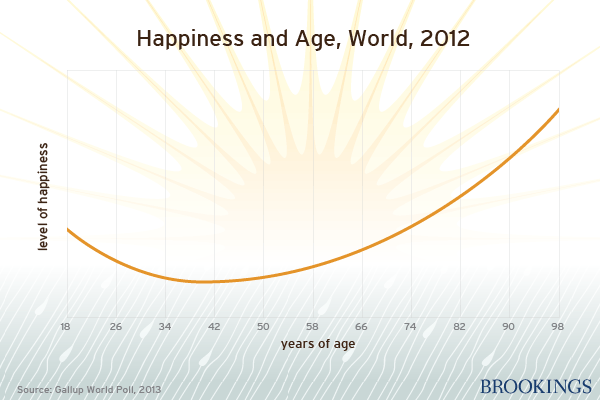
As I get older, the desire to share my story, to have it be understood and appreciated, gets stronger; yet I am acutely aware how unlikely it is. It is an ordinary life after all. My stories of love, victories, losses; anecdotes of joy, pride, and guilt; will go to the grave with me. Like tears in rain. This is for the best, of course. The new generation doesn’t need to be burdened with our past, it needs to write its own adventures. After all, you can only tell your kids about honor, heartbreak, loyalty, courage, and intellectual honesty. To understand, they must experience it for themselves, grapple with it and earn it the hard way.
Continue reading -
Intelligence is not enough
Filed under: random
The Automated Workforce - how AI will disrupt the developer’s job. This was the title of a conference talk I gave in 2018 about whether advances in AI are about to make software developers’ jobs obsolete. This was before ChatGPT had entered the zeitgeist; before Sam Altman’s return at OpenAI (along with some “business-friendly” board members) effectively destroyed any claims to altruism that company made; before Timnit Gebru tried to bring ethics to Google’s AI research and was punished for it. LLMs weren’t in the public consciousness yet, but there was some serious ink already being spilt in the media about what this coming technology wave meant for all of us.
Now I am in no way an expert on GenAI; but I was strongly motivated to do this talk for two very important reasons. First, it was a chance to speak at a conference alongside Martin Fowler, and second, there was a free trip to New York City involved.
Continue reading -
Charlie Munger, Architect (1924-2023)
Filed under: random
Charlie Munger, chairman of Berkshire Hathaway, passed away yesterday just a few weeks shy of his 100th birthday.
For a long time I idolized him as a fantastic investor and wise man - reading books about him, listening to his interviews and watching funny quips & quotes. But my most recent and lasting impression is the story of Charlie Munger, Architect.
You see, Munger became an architecture buff in later life - he loved to design buildings, especially college dorms. According to a 2019 WSJ interview “he spen[t] up to several hours a day on making architectural drawings.” In the 1980s and 90s he tried out his experiments on just his California properties (“Mungerville”), and on the $13 million Science Center he donated to Harvard-Westlake school in 1995 (his kids’ and grandkids’ Los Angeles-based prep school). Then he went bigger.
Continue reading -
Good Judgment
Filed under: work
An interview candidate asked me a weird question the other day:
“What is your favorite Leadership Principle?”
The Amazon Leadership Principles, or LPs, are familiar to anyone who’s interviewed there, because the interview questions are all looking for the candidate to demonstrate these LPs. And they’re very well known to everyone working there, since they are part of not just performance reviews and peer recognitions, but everyday work conversation. As far as corporate values go, Amazon has done a better job than most at integrating theirs into the culture. You know the LPs have seeped through when you hear it as part of the peculiar vernacular (“Let’s do a Dive Deep on this problem”, “Where’s your Have Backbone?” “Let’s Disagree and Commit here, please,” “That’s a Trustbuster.” and so on.)
I’d like to make 2 observations about the LPs (note: the views below are my own and do not reflect, etc.)
-
They are a tool for business decision-making; nothing more, nothing less. You don’t have to embody them. For example - “Frugality” is a great way to run Amazon, but Bezos isn’t a frugal person (not lately at least.)
-
They can be misused to justify any leadership decision, good or bad. The LPs are said to be “in tension” - a nice way of saying they’re mutually contradictory. As a result, anything a leader chooses to do can be matched up to an LP. For instance:
-
-
Hubris, Lies, and Consequences
Filed under: random
I’ve been thinking about leadership hubris lately, in the wake of 2 recent news events.
First, the implosion of the Titan submersible and tragic death of its 5 occupants. Among them was Stockton Rush, CEO of OceanGate (makers of Titan). As we are now learning, experts had warned the CEO for years against such a dangerous expedition without proper certification:
Continue reading -
Grind Culture
Filed under: work
Fantastic post on the futility of grind culture by Erin Gallagher (via LinkedIn) that resonates so strongly:
Hustle and grind culture is dead. Because so many of us have realized that time is not guaranteed. And we’ve decided that our lives are worth living.
We are a culture obsessed with inputs: Research. Consumption. Validation.
We are a capitalistic society focused on outputs: Hustle. Grind. Burnout.
We are a human race desperately in need of stay-puts: Presence. Stillness. Rest.
Continue reading -
Mandates vs Meaning
Filed under: random
I recently attended a talk by Karen Mangia on “Strategies to make Work From Anywhere work for employers and employees”. Had a lot of great takeaways that I wanted to share:
-
When a mandate from leaders feels like it has no meaning, or an empty meaning, the first response is resistance. Struggle ensues.
-
It comes down to trust. If you’re mandating RTO: commit to gathering with a purpose. When people are requested or required to gather - What is the purpose? Why in person? What outcome are you seeking? What is their role in the outcome? What is the expectation?
-
3 things employers can do to engage employees:
- Curiosity - “what would happen if?” or “How else could this be achieved?”
- Conversation - “What do you need so that __” - e.g. “so that you can feel a sense of community, camaraderie, connection?” or “so that you can live well and work well?”
- Choice - “why does that matter to you so much?” And just listen.
-
-
Regression to the Mean
Filed under: work
2007-2022 was a rising tide for all of Big Tech. Money was cheap, lots of fruits were hanging low, and too many individuals attributed to personal brilliance what should have been attributed to just plain luck and timing. Many leaders have likely never faced the current economic situation in their careers - what Ben Horowitz calls “peacetime CEOs”. It’ll be interesting to see their actions, now that the industry seems to be regressing to the mean.
Continue reading -
Justice
Filed under: philosophy
I firmly believe that any modern leader’s training should include Professor Michael Sandel’s course on justice and ethics. There’s a book version, but I strongly recommend watching the entire Harvard lecture series, which is available for free on YouTube:
Continue reading -
Faster Horses
Filed under: work
The best product managers are customer-obsessed. They represent the “voice of the customer” for their engineering teams.
Some well-intentioned but ineffective product managers are also customer-focused, but they misunderstand the assignment. They take the customer’s word at face value instead of digging deeper. As Henry Ford said: “If I had asked people what they wanted, they would have said faster horses.”
To me, great product managers apply two critical skills when listening to the customer:
-
They discern whether the customer is describing their core problem (e.g. wanting to travel faster), or a solution they think will solve it (e.g. wanting a faster horse). If it’s the latter, the worst thing I can do is go “yes ma’m!” and build exactly that. It takes good domain knowledge, strong judgment, and some decent sense of tradeoffs to make the right call.
-
They have the humility to not think they always know better than the customer. After all, while Ford was spot-on about customers not needing faster horses, he was also dead wrong about customers wanting just one style of car: the black Model-T.
It’s a delicate balance. I’ve only seen a few PMs get it right - and even they don’t get it right 100% of the time.
Continue reading -
-
The Corporate Hierarchy
Filed under: random
Interesting perspective of the corporate hierarchy and the roles different people play in it:
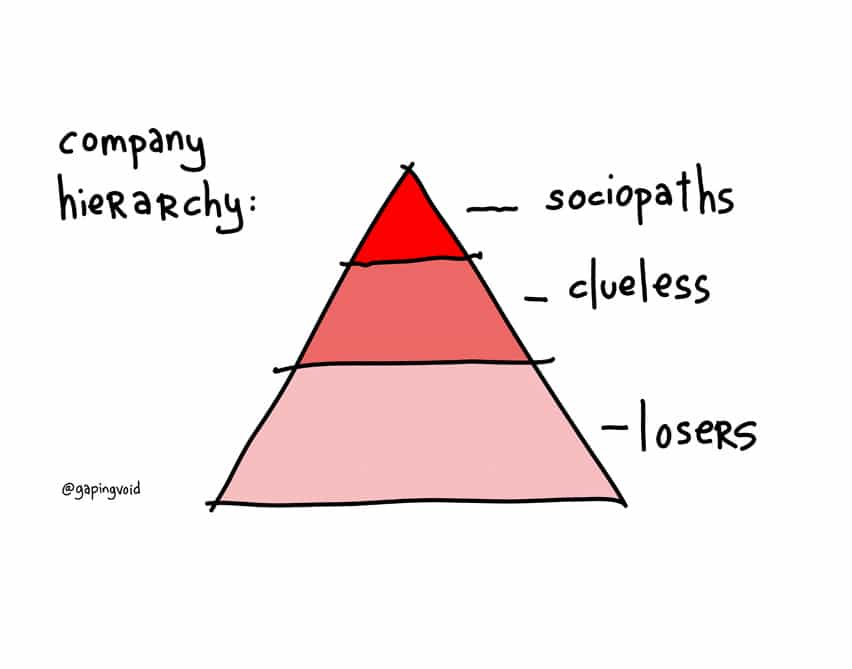 Source: Gaping Void by Hugh Macleod
Source: Gaping Void by Hugh MacleodMy first instinct on seeing this comic was to laugh out loud at the snark; but reading this accompanying article by Erik Dietrich made me think that this is a masterpiece.
Continue reading -
The Discipline of Remote Work
Filed under: work
Beginning in late 2022, an increasing number of companies have asked employees to return to office. Apple, Twitter, Microsoft, Google, Goldman Sachs, Morgan Stanley are just a few of the big names. Leaders cited reasons such as “culture”, “innovation”, “collaboration”, and other such pablum. The peak of this wave came recently from Jamie Dimon, CEO of JPMorgan, who said the quiet part out loud:
“It doesn’t work for young kids, it doesn’t work for spontaneity, it doesn’t really work for management. I think it’s perfectly reasonable to help women. For example, COVID taught us the burden on women, because they take the primary care, for parent care, etcetera, is enormous. Modify your company to help women stay home a little. It might also be OK to have remote or hybrid workers in some jobs, but it better be okay for the company, the clients, not just the individual.”
Yikes.
Continue reading -
Three Things
Filed under: humor
Craig Ferguson was, to me, the epitome of late night talk show hosts. And like all great humorists, he was as insightful and grounded as he was funny. This bit of advice on “the three things” is something I have to remind myself of, every time I’m about to pompously “well actually” someone:
- Does this need to be said?
- Does this need to be said by me?
- Does this need to be said by me right now?
-
The Myth of Infinite Resources
Filed under: random
On his first trip to the United States, my father made an observation:
“This country runs as if it has infinite resources.”
 NYC at Night - by Sven Becker
NYC at Night - by Sven BeckerOnce he said it, I couldn’t unsee the truth of it everywhere. Office buildings with their lights on all night. People driving gas-guzzlers 50 miles to work daily. 8,000 square-foot homes that leave the thermostat at 68°F in peak summer while the energy grid fails. Vegas hotels with their swimming pools and fountaions, while 30 miles away, Lake Mead falls to historically low levels. The sheer amount of food wasted in our restaurants, grocery stores, and homes (upwards of 30% apparently). Even simple things like taking 20-minute showers, or walking away to do another chore while the water is running.
Continue reading -
Second Chances
Filed under: pop culture
In the controversy around Jeremy Clarkson’s despicable comments about the Duchess of Sussex, I am thinking about second chances. As a devoted fan of the old Top Gear who remembers and can quote many of their best clips from the first 18 seasions by heart - and as someone actively trying to work out how to separate a great end-product from its troublesome origins (see my previous post) - I’ve asked myself: what, if anything, could induce me to give Clarkson a second chance? Is his work ruined for me forever?
(warning: this may be a bit of a rambling post as I try to work out all the threads shooting off related to the subject)
Our society has a predictable response to people who are caught doing illegal, unethical, or immoral things. For the poor or powerless, one strike (or even the possibility) could be enough to ruin your future. The consequences far outweigh the severity of their act (the 8th amendment notwithstanding). Also, predictably, the consequences are proportionally unfair along existing racial, gender, and other inequalities. This system is by design, of course. It’s how institutions (and those who are in charge) wield authority over these people and “keep them in line”.
For the rich and powerful, different rules apply.
Continue reading -
How is Twitter Still Working?
Filed under: technology
I recently came across a LinkedIn article by Casey Rosenthal that is worth your time: Decline and fall of a billionaire’s Twitter. It tries to answer an interesting question: How has Twitter not crashed yet? How is it still running, despite over 75% of its staff being gutted, and after hitting (per its new owner) an all-time high in site visits? Remember: some people had predicted it would crash within a week of the firings.
Rosenthal has some expertise in this domain: he used to lead the Chaos Engineering team at Netflix, now runs a company specializing in complex system resiliency, and has authored a book and several IEEE papers on the subject.
Continue reading -
Bread and Circuses
Filed under: sport
One of my life’s lasting joys will be having watched Lionel Messi lift the football World Cup on 18th Dec 2022, in perhaps the greatest sporting event ever televised. What a privilege to have lived in the time of Messi and Ronaldo, of Federer and Nadal and Serena, of Sachin and Warne and Dhoni and Kohli, of Kasparov and Carlsen, of Usain Bolt, of Schumacher and Hamilton. Men rise and fall like the winter wheat, but these names will never die.
 Leo Messi in 2023
Leo Messi in 2023
Continue reading Sachin Tendulkar in 2011
Sachin Tendulkar in 2011 -
Micro Resilience
Filed under: books
Modern life is relentless. I’ve written in the past about “the wobble” - the need to balance everything in life that needs your attention. The assumption is that the Macro picture is not fixable - at least, not quickly or easily anyway. The Macro is the the big things in life - where you work, where you live, who you marry, whether or not you have kids. But within those constraints, can you optimize the micro, the little things, to make your day slightly better? The goal is to maybe get a little more energy for all the other things in life. To that end, I found the advice in this little self-help book rather useful; like a little Cliffs Notes version of the Seven Habits.
Continue reading -
War
Filed under: books
Close friends know that I am a big fan of war history. My father, after retirement in his late 50s, became a historian and published author of several books about WWII and freedom struggles around the world. Growing up, I remember our home packed to the gills with books on the subject. Dad would spend his Sunday mornings (he worked 6 days a week at the bank) browsing the hundreds of little second-hand bookstores that dotted Bangalore in its glory days. He’d bring home as many WWII books he could, and we would spend our Sunday afternoons reading through them. Not that I understood the text much; but pictures of war always tell you the story well enough. Come to think of it, a lot of my early reading habits were just a way to try to be closer to my father - what 12-year old understands Stephen Covey’s Seven Habits, Hawking’ A Brief History of Time, or Alfred Sloan’s My Years with General Motors?
Continue reading -
Clarity
Filed under: books
Sometimes life offers you clarity in a flash.
Recently I’ve been trying to read Nassim Taleb’s books Antifragile and Skin in the Game based on a recommendation by a close friend. And to be honest, it’s been a grind. I just couldn’t manage more than a few pages at a time. The writer’s style is… difficult. He zigzags from thought to thought, he states conclusions as if they’re already proven or trivially obvious, and he frequently throws snark at people he dislikes. I felt lost. Still, I kept pushing on, because (a) the germ of the idea makes sense and the author keeps hinting at deeper insights, and (b) according to the reviews, people seem to think that Taleb’s a genius and that these are important ideas, In other words, I thought I just wasn’t getting it.
Continue reading -
Career Health
Filed under: career
As the Big Tech layoffs continue and thousands of highly-qualified people suddenly find themselves out of a job, I want to revisit the topic of maintaining your career health.
A little background. Thanks to decades of legislation, the average US worker is at a massive power disadvantage against their employer. It’s a completely one-sided relationship: we rely on jobs for our healthcare and pensions (401k), we have a majority of our human interactions at work, and (let’s be honest) we tie a big chunk of our identities to our paychecks and titles. Having that connection unexpectedly severed can be difficult, even traumatic. My own career began around the 2007-08 Financial Crisis, and over the years I have seen first-hand the pain of losing your job. Colleagues and friends who were forced to uproot their lives and move to a different state/country, or who couldn’t maintain healthcare coverage for a loved one, or suffered from debilitating stress and crises of confidence after being fired. I still carry some PTSD from all those times.
Looking at all these stories on LinkedIn of people who were shocked to get fired, I think “there but for the grace of god go I”. And I go back to my coping strategies. They may not work perfectly, they may not work for everyone; but they give me some control over my fate in uncertain times. I’ve listed them below, if they come in handy for someone else.
Continue reading -
Investing in People
Filed under: business
Warren Buffett, in his 1986 letter to shareholders, defined his investment philosophy:
We simply attempt to be fearful when others are greedy and to be greedy only when others are fearful.
In other words, good investors buy low and sell high. They don’t follow market frenzies or panics; they pursue strategic positions based on their long-term interests. They keep some “ammo dry” at all times so they can capitalize on one-off unexpected opportunities.
Continue reading -
Wage Slavery
Filed under: work
Recently, I was piqued by a comment from Scott Galloway on the Pivot podcast regarding the layoffs at Twitter, Amazon, Facebook et al:
Continue readingThese folks are the most re-hireable people in the economy. These are over-educated people who are very talented. Their problem won’t be getting another job, their problem will be that they’re under the delusion that they’re more important than they are. They’ll go to another organization and expect to get 4 days of pet bereavement leave.
-
Memento, homo
Filed under: philosophy
Memento, homo, quia pulvis es, et in pulverem reverteris.
Remember, man, that you are dust, and to dust you shall return.
Continue reading -
Skin in the Game
Filed under: business
What does it mean for leaders to have “skin in the game”? When their decisions go wrong, when their big ideas fail, who pays the highest price?
I’ve been reading Nassim Nicholas Taleb’s latest book of the same name. Generally, I’m not a big fan of Taleb’s writing: he tends to poke fun at “intellectualistas [and their] elaborate semiabstract buzzword-laden discourse”, which ironically describes his own style perfectly. But this book was recommended by a trusted colleague, so I dug in.

Right from the prologue some observations are hitting home. Taleb highlights the asymmetry of risk/reward in our world, where for an elite few, “heads they win, tails they shout black swan!”
Continue reading -
On Elon and Twitter
Filed under: poetry
लगा कर आग शहर को
Continue reading
बादशाह ने कहा
“उठा है दिल में आज
तमाशे का शौक़ बहुत ।” -
Twitter
Filed under: random
At this moment on 10/31/22, only one person at Twitter knows what the master plan (no pun intended) is, or if there is a plan. But I can only live by what I perceive; and what has happened there recently just seems wrong. The 7,500 or so employees who poured so much into that product shouldn’t have had to deal with such uncertainty and whimsicality from their leaders. And while Bret Taylor wins accolades for handling the deal beautifully on behalf of Twitter’s shareholders (who walked away with $54.20 per share), I wish he or the rest of Twitter leadership had done more to protect their employees.
Continue reading -
Justice
Filed under: learning
Fiat justitia ruat caelum
A legal phrase meaning “Let justice be done, though the heavens fall.” Don’t hold back on doing the right thing for fear of the consequences.
Continue reading -
Teaching Experts
Filed under: learning
Coaching isn’t simple. Lately I’ve been trying to improve my coaching and mentoring skills, specifically around tailoring my advice to the other person.
In that context, I just came across two excellent examples of coaching people at different levels. The topic is rock climbing; but the themes in the videos are universal.
Example 1: Magnus Midtbø free soloing with Alex Honnold up the Armatron near Vegas.
Continue reading -
What does a TPM do, anyway?
Filed under: work
Since taking on a TPM role at Amazon about 18 months ago, some friends have asked: what does TPM mean? “What is it you do exactly?”
Sometimes it’s really hard to explain, because the TPM role at Amazon is unique. It’s born out of necessity due to the unique organizational structure at Amazon. Our development teams are small, mostly independent, and have an incredible amount of flexibility to choose their own priorities. And due to the scale we operate at, it’s near-impossible for just one or two teams to deliver a major change. It takes the coordinated effort of 5, 10, 20, 50 (or sometimes even more) separate teams to deliver meaningful programs that significantly impact the bottom line. And the coordination of those pieces is a TPM’s ultimate responsiblity. They may not have to do every single thing; but they are the ultimate owner of the solution that is delivered. To succeed, a good TPM needs to be good at multiple skills: an understanding of software development and system design, product design awareness, project management, communication, business analysis, quality assessment, time management, a knack for key metrics, an appetite for conflict resolution and simplicity… etc. etc. They are the glue that holds everything together and fills any gaps needed to get to the goal. On any given day they could be playing 4-5 different roles.
Continue reading -
(Unless you know better ones)
Filed under: writing
As a new employee at Amazon, one of the distinctive cultural notions I really like is their addendum at the end of every tenet.
Our Tenets (unless you know better ones)
These are our leadership principles, unless you know better ones. Please be a leader.
This goes from the Leadership Principles all the way down to team-level and individual role guidelines. This is an invitation - to think, to critically evaluate, to speak up, and to improve.
Continue reading -
Tenets
Filed under: life
Building a great culture requires you to convey “guiding principles” across the length and breadth of the organization. At Amazon, this is done through Tenets.
Tenets are principles or beliefs. They’re how you choose to conduct yourself. They are how, as a leader, you enable others to make great decisions without your involvement. They enable you and your team to prioritize, make tradeoffs, course-correct when things have gone off. They’re critical for delegating decision-making authority to where the action is; not where the centralized power is. And they’re critical for leaving a legacy.
Tenets work for personal decision-making as well. Here are mine:
Continue reading -
My Favorite Poetry Quotes
Filed under: arts
Bliss was it in that dawn to be alive,
But to be young was very heaven!
– William Wordsworth, The French Revolution as It Appeared to Enthusiasts at Its Commencement
Bas ki dushwar hai har kaam ka aasan hona
Aadmi ko nahin naseeb insaan hona
– Mirza Ghalib #
Phaila tha Maseeh-e-waqt ban kar
Simta to saleeb ho gaya hai
– Zulfi
I can never read all the books I want; I can never be all the people I want and live all the lives I want. I can never train myself in all the skills I want. And why do I want? I want to live and feel all the shades, tones and variations of mental and physical experience possible in my life. And I am horribly limited. – Sylvia Plath
Continue readingBefore you heal someone, ask them if they’re willing to give up the things that made them sick.
– Hippocrates -
You want a square wheel? We can do that.
Filed under: consulting
I’ve been in the consulting business my entire career. It’s a difficult business - specifically, the practice of billing by the hour means that you can never ever step off the treadmill. If you stop working, the money stops flowing. We call this the “6-month cliff” - i.e. if we stopped selling work today, in about 6 months our business would fall off a cliff.
Sales are the lifeblood - and there are as many sales techniques as there are minutes in the year.
Continue reading -
Balance
Filed under: life
Do you know of Ronnie Coleman? Perhaps the greatest bodybuilder of all time, an 8-time Mr. Olympia winner, a champion among champions.

It’s near-impossible to describe how amazing a phenom he was. Perhaps the best way is through analogy: Ronnie is to bodybuilding what Roger Federer, Sachin Tendulkar, Michael Jordan, Serena Williams, Michael Schumacher, Ronnie O’Sullivan, or Lionel Messi are to their respective sports. I grew up idolizing him in my teens.
Continue reading -
Bottle Caps
Filed under: life
My 4 year old made an unusual demand today:
“Dad, you’ve got to keep this bottle cap forever.”
I smiled. We had just been riding scooters outside, and while drinking water, the bottle cap fell from my hand and rolled away. He retrieved it for me and then said those words.
Continue reading
-
Transitions
Filed under: life
The steady-state present is okay. The steady-state future is okay too. It’s the transition that is hard.
Continue reading
-
Coach, Mentor, Advisor, Sponsor
Filed under: leadership
During a 1-on-1 with my coach today, I noticed that she used the terms “Coach”, “Mentor”, “Advisor” and “Sponsor” very distinctly and deliberately.
Advisor / Mentor / Coach / Sponsor
- are all different!
- Advisor, Mentor: is about sharing your skills/experiences to help them
- Coach: is about enhancing the coachee’s experiences, skills and needs
- Sponsor: is about connecting, advocating, lending your privilege
-
120% Time
Filed under: career
Great excerpt from an article about ex-Yahoo CEO Marissa Mayer:
Continue reading“It’s funny,” she said. “People have been asking me since I got here, ‘When is Yahoo going to have 20% time?’”
“I’ve got to tell you the dirty little secret of Google’s 20% time. It’s really 120% time.”
She said that 20% time projects aren’t projects you can do instead of doing your regular job for a whole day every week. It’s “stuff that you’ve got to do beyond your regular job.”
-
2018 XConf Dallas: Building a Lean Agile Culture
Filed under: conferences
Slides and audio recording from my talk “Building a Lean Culture through Servant Leadership” are now posted online:
Continue reading -
There Is No Nail
Filed under: communication
Active listening is crucial for connecting with another person. To understand, to have empathy, you must first truly listen to them. The key roadblock is ego - our need to appear smart, to assert our viewpoint, to be the “problem solver”. Today I’d like to share a mental exercise that helps me control that inclination.
Have you seen that classic video “It’s not about the nail” yet?
It’s a great sketch on interpersonal conflict. You may find even similarities with your own life.
Continue reading -
Decision Records
Filed under: work
One of my favorite new techniques in the ThoughtWorks Technology Radar is the Lightweight Architectural Decision Record.
The beauty of this technique is that “we’ve always done it this way” is not a good excuse anymore. Teams are empowered to review and (if need be) change established decisions and practices. Knowing why a certain decision was made - the context, timing, key players etc. is critical for knowing when it’s okay to change those decisions.
It makes me wonder - why don’t we do something similar for leadership decisions? Why are a leader’s decisions to be treated differently than architectural/technical decisions? They also are highly contextual, often based on the conditions of the moment. And when situations change, it’s perfectly reasonable to revisit those decisions and ask “why not change?”
Even if it’s just for my own benefit, I’m resolved to start writing down my “Business Decision Records.”
Continue reading -
Expert Advice
Filed under: general
tl;dr: If your advisor’s definition of success is different from yours, you may be better off ignoring their advice.
Continue reading -
Playing the Piano at Nordstrom's
Filed under: consulting, work
I wanted to share a striking visual from a recent Overthinking It podcast on self-improvement.

Most professional jobs are like playing piano at a Nordstrom’s.
The core skill (playing piano, in this case) doesn’t matter too much once you get past a certain point (the interview, or the first 30 days)
Continue reading -
Classification v/s Action
Filed under: leadership
Classification is a great substitute for actual wisdom
- Peter Fenzel, Overthinking It podcast
My family loves playing board games. Our new favorite is Guess Who? by Hasbro. You win by identifying the person on your opponent’s hidden card, using only Yes/No questions to narrow down the possibilities.

It struck me that most management literature is like a game of Guess Who - it’s all about classifying things.
Continue reading -
#9ReplyGuys
Filed under: social media
The wonderful team of @shrewshrew and @sbarolo have done something wonderful: given everyone a way to recognize, label and brush off Twitter mansplainers of all kinds. I’m sharing this with my network as fast as I can.
It’s also embarassing to remember all the times I have been one of these ReplyGuys. Trying to do better each day.
Check out the power of #9replyguys in action:
Continue reading -
Scaling Intentionally
Filed under: work
Recently I was complaining to my mentor how a certain company we know is doing such a poor job of keeping their culture as they tried to grow. He explained the “why” to me this way:
When a small company is successful, but doesn’t know why, then scaling up is going to be painful. You need to know what it is you’re trying to scale up.
This struck me as extremely insightful. If you don’t know what made you successful, what to preserve as you aim for bigger things… well of course your culture will deteriorate.
Similar to a monolithic system architecture that gives you a lot of things “for free”. To scale up you need to move to a microservices architecture - but that means teasing out those implicit core domain concepts, dependencies, assumptions, and bottlenecks and making them explicit. Ditto with culture.
Continue reading -
Big Fish in a Small Pond
Filed under: speaking
Around 2008, as a young consultant, I was looking for a technical area to focus on for the next 2-3 years. Ruby on Rails was beginning to gain a lot of steam back then - in comparison, my C# .Net 3.5 stack looked clunky. So I went and asked my mentor if Ruby would be a good area to specialize in.
Continue reading -
Storytelling
Filed under: speaking
I started public speaking with zero skill or experience, so I dug deep into the one storytelling tactic available to me: the personal angle.
Well, this Mad Men bit just reminded me that the personal story, truly, is the most powerful storytelling tactic of all:
Mad Men - The Carousel
Continue reading -
An Agile Life
Filed under: life
An agile life must take reality into account, must learn from mistaken assumptions (as well as bad implementations) and pivot ASAP towards better.
A waterfall life, in contrast, keeps on going today with poor decisions that were made ages ago - just because.
When I was a teenager, I had everything planned out about my life.
- Get promoted at each opportunity until I reach VP or CEO (like my dad, who never missed a promotion)
- Get married between 30 and 35 (like my dad)
- MBA from an Ivy League school in my late 20s (because reasons)
Looking back, almost none of it turned out as I had planned - and yet, I’m quite happy right now.
Continue reading -
Guide to Developer Job Ads
Filed under: work, humor
Continue reading
-
Code in Presentations
Filed under: speaking
Are you preparing a technical talk? Want to put some code up on slides?
Don’t. Do. It.
Slides with lots of text are difficult to read. Slides with lots of code are really, really difficult to read. You’ll lose your audience quickly.
But if you must…
Continue reading -
Book Sale!
Filed under: personal
Temporary, time-bound post, valid until Sep 3, 2018.
As part of some spring cleaning, I’m giving away a bunch of books (yes, free as in beer). Please let me know if you’d like any of them!
Continue reading -
The 'I will judge for myself' Syndrome
Filed under: work, leadership
This is a story of how your ego as a leader can hurt your teams and create poor outcomes despite your best intentions. It offers a few ideas on how to avoid them.
(*names changed for privacy)
(**These are just my version of the events as I saw them.)
It was my first week on the project. I was taking over as Tech Lead from another colleague who was leaving. And as part of my onboarding, he was giving a quick run-down on each team member.
When it came to Sally* he said:
Watch out for her. She’s having performance issues. She’s not really engaged at work, and the client thinks she’s not competent.
“Hmm. I will judge for myself,” I thought.
Continue reading -
Compared to Whom?
Filed under: work
“Our company has an amazing culture!”
Compared to whom?
Continue reading -
Operational Inefficiency
Filed under: work
3 months ago a good friend moved jobs from consulting into the airline industry. I caught up with him recently.
Me: “So, how’s the new gig?”
Continue readingHim: “Terrible. At the previous place I used to wear 3-4 hats in my role. Here they have 3-4 people for every hat! I’m so bored.”
-
XConf NA: How AI will change the Developer's Role
Filed under: speaking
My talk at XConf North America (July 20, 2018 in NYC) is now available online:
Continue reading -
Open Office Spaces: good or bad for productivity?
Filed under: agile, work
Are open office spaces good or bad for productivity?
This eternal debate got a reboot at work this week when someone shared this article.
Maybe there’s an “agile” way to think about this. Maybe different workspaces are better suited for different kinds of problems. Just like we adapt our sprint length based on the level of uncertainty (i.e. lots of unknowns => have shorter sprints), maybe we adjust our workspaces according to the challenge at hand.
Continue reading -
Some Notes on Conference Speaking
Filed under: speaking
This week marked the 1-year anniversary of my joining ThoughtWorks. It’s a wonderfully unique culture. Despite the pressures of a global consulting business, it stil manages to foster growth and a diversity of ideas. On me, the biggest impact has been that I’ve now become a half-decent public speaker.
Until last year, conference speaking wasn’t even in my list of things to do. But a colleague shared an interesting speaking opportunity, then my boss encouraged me, then a mentor helped craft the proposal, then 2 amazing colleagues volunteered to give feedback on the talk… and et voila.
Continue reading -
Strong Opinions, Weakly Held
Filed under: communication
[My communication mantra is “Strong Opinions, Weakly Held.” Recently someone asked me about that phrase, and what it means to me. Here’s what I said:]
I first encountered the phrase on Jeff Atwood’s blog, and since then have also seen it pop up in other places. The original article is still great, and references a wonderful post by Kathy Sierra, so I encourage you to take a look.
Continue reading -
What is the value of User Stories anyway?
Filed under: agile
[Recently, an internal company thread discussed the “value” of user stories. In an agile context, what is the value of switching from a system of ‘tickets’ (someone writes a brief statement describing the work and the engineer goes off and builds a thing) to user story-driven development. Here are my thoughts.]
No matter what anyone says, value in a business context should ultimately be measured in $$ (ROI). If user stories don’t get you to ROI sooner, via faster time-to-market or with a better product, then they aren’t useful. And if we don’t know how to get that ROI faster, then just adding user stories to the process isn’t going to help.
Continue reading -
Running and testing cron locally
Filed under: programming
About once every 2 years, I get a new machine and have to set up crontab locally all over again… and completely forget how to do it. Wrote this up as a reminder for future me.
How to read a cron entry
Continue reading -
Saccades
Filed under: programming
Have you watched Avdi Grimm’s keynote “The Soul of Software”?
Avdi Grimm - The Soul of Software
The talk is one of the most thought-provoking I’ve heard; but one particular concept has stuck in my mind: saccades. Saccades affect our perception of reality. It’s another form of mental blind spots - we can’t change the fact that our brain does this; but we can become more aware of it.
In my experience, “saccades” aren’t just a visual trick. They occur during conversations as well. If you aren’t truly listening, your mind will fill in the blanks with its own version of the truth. A lot of early practitioners of active listening are surprised by how different “what was said” and “what I heard” can be.
Just another reminder to constantly practice mindfulness as often as possible.
Continue reading -
Victims of Progress: developers in the age of AI
Filed under: technology, AI, society
Are you a developer? How do you feel about this 1980s IBM ad?
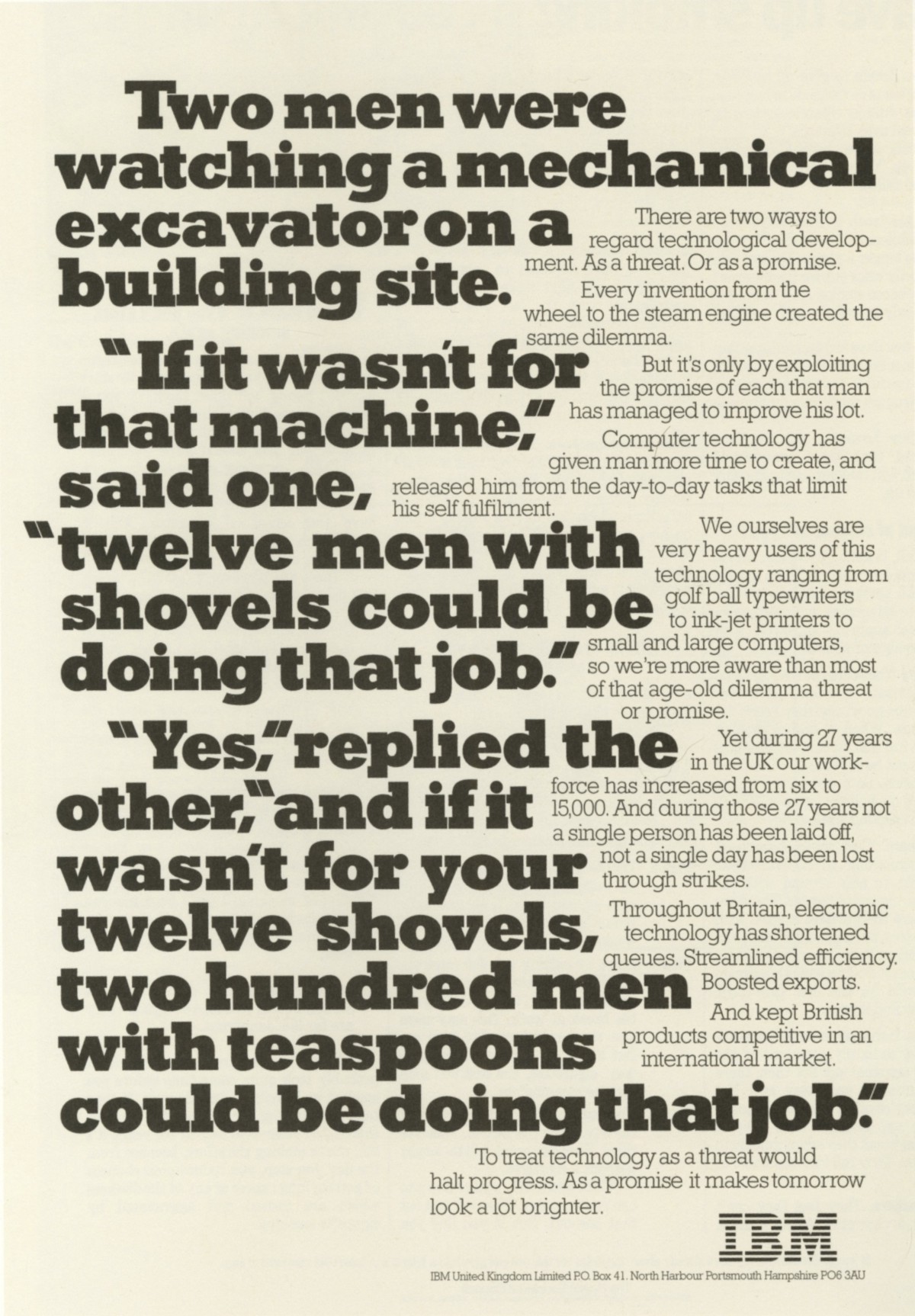
Was your reaction something like this:
“Of course we don’t want to replace excavators with shovel-weilding manual labor! Progress is inevitable and it helps society!”
I agree with you. Now… how does this article’s title make you feel?
Continue reading -
Scope Didn't Change; Understanding Grew
Filed under: consulting, work
The end result of most Waterfall-style projects looks like this:
How code quality evolves as the deadline approaches

The middle-to-end period of such projects is usually marked by vicious scope arguments, long hours, lots of bugs and lots of technical debt. Responding to change? Forget about it!
One common antidote is to start with an MVP (minimally viable product) to validate the larger project’s viability. Unfortunately, people who come from a Waterfall world usually treat MVPs as part of a 2-step process: e.g. doing a 6-week MVP to decide Go/No-go on a 2-year project. The leap from MVP to full project is still too large:
Continue reading -
The 'Safe Hammer' Anti-pattern
Filed under: consulting, work
Once there was a carpenter who thought his apprentices weren’t smart enough to use hammers properly. So even though he’d buy the best tools on the market:

… he’d then forbid the use of certain “unsafe” features, leaving his apprentices with this:
Continue reading -
Résumé Advice: don't undersell yourself!
Filed under: work
From time to time I’ve helped some friends with résumé advice. One pattern that has struck me: certain people appear to punch way above their weight on paper, while others waaaay undersell themselves. The latter group includes humble, self-deprecating servand leaders, but it also often includes underprivileged or minority people.
This is such a shame. For these people to tell their true story, show their whole set of capabilities, would be such a big step towards them getting their due recognition.
Here are a couple of quick pointers I’ve found useful when assisting these amazing, humble people:
Continue reading -
The -ilities Framework
Filed under: work
Today at work, someone shared this framework for evaluating quality:
Continue reading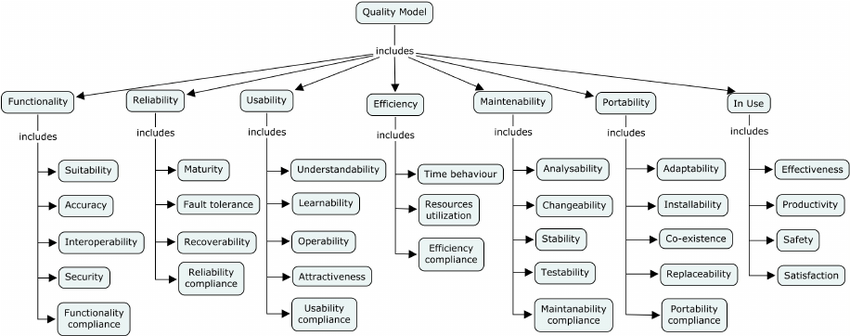
-
DevOps cannot succeed where Agile has failed
Filed under: agile
Here’s a controversial opinion: if your organization struggles with being agile, it’ll struggle with DevOps. DevOps cannot succeed where Agile has failed.
Why? Here’s my hypothesis:
-
Agile, DevOps, Lean are all manifestations of the same principles. Collaborate better, reduce waste, focus on customer value, continually improve.
-
These fundamental principles are either part of the culture already, or they’re not. As a result, for organizations that already grok agility, DevOps feels like a natural next step. For those that don’t, it feels like a challenge, a threat to existing systems, practices, and hierarchies.
-
-
Reflections on 2018 Lead Dev Conference Austin
Filed under: conferences
This week I was fortunate enough to present my first major conference talk - the 2018 Lead Developer conference at Austin TX. Wanted to jot down my reflections and notes for future talks.
Continue reading -
Finding vs Attracting Talent
Filed under: general
Words matter. The metaphors we use can lead us down paths that lead to very different, very unintended outcomes.
Recently, I heard of a project idea to use Machine Learning to improve a company’s recruiting efficiency. Using candidates’ social profiles (Github, Stack Overflow, LinkedIn, Quora), the team wanted to predict candidates’ likelihood of getting hired - thus allowing HR to target candidates who wouldn’t have otherwise known of the company. This also meant establishing a baseline of data using current and past employees’ profiles.
Luckily, enough people spoke up about the legal and moral problems with this idea that it was nixed. Just as a sampler:
Continue reading -
"Time to First Commit" as a metric
Filed under: development, work
For a while now, I’ve tracked my time-to-first-commit on each new client project. i.e. how long is the time gap between starting on the project, and making my first meaningful commit to the code base?
Over the years, this number has varied from a few hours to several weeks. And with almost 100% correlation, the shorter that time gap, the happier I’ve been over the long term as a developer on that project.
Continue reading -
The Genius of Raj Kapoor
Filed under: inspirational, arts
My final post (for now) on the art and artists of my youth. This particular one is special to me: Raj Kapoor, because I inherited this love from my father. My father wasn’t a very expressive man, and I - as a child who wanted to be close to him and emulate him, started watching Raj Kapoor movies and listening to their music from an early age.
I always found it challenging to watch those movies. Alongside the humor was a deep sadness, a pathos, that hits hard and stays stuck in your mind.
Continue reading -
The Genius of Ghalib
Filed under: inspirational, arts
I have previously described the unique joy of art created by multiple geniuses coming together. Well, here’s another combo I can’t seem to stop watching: Mirza Ghalib’s poetry narrated by Kader Khan.
A word on these two artists.
Mirza Ghalib is renowned as one of the greatest Urdu poets of all time. Like Shakespeare, his work is evergreen and rewards deeper analysis. His life was unhappy - and it reflects in his best couplets. Even after 150 years since passing, people all over the world organize poetry readings of his work.
Continue reading -
Grow like a Tree
Filed under: inspirational
[Note: recently decided to write a little bit more about the inspirational artists I’ve encountered over time. And no better or easier place to start than with comedy.]
Humorists observe universal truths, then present them in ways that make you laugh and think. Some examples come to mind - Douglas Adams, Oscar Wilde, Stephen Colbert, P.G. Wodehouse.
One name from my youth in India doesn’t get much attention nowadays: Dr. Surendra Sharma, an exponent of हास्य रस कविता (humorous poetry) and awardee of the Padma Shri (India’s fourth-highest civilian honor.) His poker-faced, mild-mannered, monotonic rustic delivery of लुगाई (wife) jokes made him famous; but Dr. Sharma has way more depth than that.
Continue reading -
Being Agile
Filed under: agile, work, consulting
Note: This is the 3rd and final post in a series about how to truly adopt agility. The first post defined the problem pattern, the second post proposed the root cause. In this final post, we propose some ideas that may help.
Picking up from the last thread: how do you “be” agile? How do you do it at scale?
My own philosophy is to not reach for quick-fix solutions too soon. The inside-out route, though slower, yields better results over the long run.
Continue reading -
One Level Deeper
Filed under: agile, work, consulting
Note: This is the 2nd post in a series about how to truly adopt agility. The first post defined the problem pattern.
Developers are often encouraged to understand one level deeper than what they’re working at.
- Don’t just know WCF or Spring; understand how HTTP and REST work.
- Don’t just learn Power BI or Azure ML; learn some of the mathematical & statistical underpinnings of data science.
- Don’t just learn React or VueJS; understand a bit about how the DOM works.
We get this about our technology. But do we get it about our practices?
Continue reading -
The Idea Adoption Lifecycle
Filed under: agile, work, consulting
Our industry is not short on great ideas. Agile, TDD, CI/CD, Lean, XP, Pair programming, DevOps are all great ideas.
At the same time, there’s a pattern of failure to adopt these ideas, that we have seen repeatedly. It happened with Agile, is happening now with Lean, and I’m afraid it will happen to DevOps as well. Here’s what it looks like:
Continue reading -
The Wobble
Filed under: life
Just coming back from the holiday season? Got those back-to-work blues and wishing you had better work-life balance?
Well, today I’m asking you to forget the concept of work-life balance. Here’s a better concept for you: the wobble.

“The Wobble” idea was taught to me by the wonderful John Humphrey when I was just a young consultant, and it stayed with me all these years.
The idea in brief
At any time, the many dimensions of your life are all pulling at you, demanding your time and attention:
Continue reading -
When Life Interferes with Work
Filed under: life
I just attended a 1-hour video conference with an Executive Principal at my company, while cradling my newborn infant in my lap, at home, because we’re having a babysitter emergency today.
Yes, today I became that BBC dad.
Professor Robert Kelly and kids

And you know what? It turned out okay. We laughed about it, I made sure the baby was quiet, and we got things done. And I was so grateful for working with people who understand that work and life can’t always be 100% separate.
Continue reading -
Kent Beck on Partitioning Complexity
Filed under: development
Some years ago, I heard Kent Beck at a conference say that he felt tremendous impostor syndrome when he started working at Facebook.
“Kent Beck?” I said to myself, “feels impostor syndrome?!!”
Made me feel a lot better about my own bouts of dealing with it.
Anyway, his latest post on tackling complexity is just brilliant. Please give it a thorough read:
Continue reading -
Don't Worry About Long Standups
Filed under: work
In most places, a standup that lasts more than 10-15 minutes is an anti-pattern. As Jason Yip says on Martin Fowler’s blog (the de facto source of definitions for any controversial tech topic these days):
We stand up to keep the meeting short.
This has become such a nostrum that people have adopted extreme measures to avoid long standups:
Continue reading -
On the Non-Linearity of Success
Filed under: life
Early in my career, I used to think about career growth like a school kid would about getting straight A’s. Work hard, show your smarts, check all the boxes, and you will be rewarded. I used to say my eventual ambition was to be CEO; because it was the corporate equivalent of being at the top of my class.
A mentor once told me that book-smart students often think that way. Like me, he had grown up in a typical working-class Asian household, and the pressure to succeed academically was huge. There’s a brilliant parody of this by Goodness Gracious Me:
Continue reading -
The 'Yes, And...' World View
Filed under: communication
OverThinking It is my all-favorite podcast, and this week’s episode is a great example why. They discussed the recent Harvey Weinstein controversy, and attempted to (in their own words):
“make a sincere effort to overthink current scandals in a way that is useful and sensitive.”
In a world where being “internet famous” is an aspiration, and where “thought leadership” means being critical of others’ ideas or having strong opinions about everything; it’s refreshing to find people who are trying not to judge but to understand. Not to critique but to connect.
Continue reading -
Escalate!
Filed under: consulting
(Update 10/26/17: hear it directly from the man who taught me this lesson!)
When your current communication channel isn’t working, escalate!
Continue reading -
Tu Quoque: Anatomy of an online argument
Filed under: thinking
Does hypocrisy invalidate an argument? Consider the following examples:
Person A: “Global warming is a real threat to human society.”
Person B: “But you drive 50 miles a day in your big SUV. You’re such a hypocrite!”Person A: “I’m a vegan by choice, because I’m against cruelty towards animals.”
Person B: “Plants are living things too. You’re such a hypocrite!”In these exchanges, person B seems to have negated person A’s claim. They have also, essentially, shut down the conversation that person A wanted to start.
Continue reading -
Protecting Your Identity Online
Filed under: security
So, quick question: have you done anything to protect your identity after the Equifax data breach? If you haven’t heard, or would prefer not to re-read the details, here’s a funny take by Stephen Colbert on the whole thing:
The breach, and the circus parade of technical, legal and ethical snafus by Equifax that followed, are a reminder that we live in an unsafe digital world.
Continue reading -
You f***ed up a long time ago!
Filed under: consulting
A question about code reviews on my company’s intranet recently piqued my interest:
Continue reading -
Clay Idols
Filed under: general
I recently got a chance to work with the wonderful Adria Richards, only later realizing that she’s friends with many of my tech heroes - Brianna Wu, Scott Hanselman, Coraline Ada Ehmke among others. We also had a chance to discuss the problem of sexism and bias in the tech industry - examples being Coraline’s year at Github, Sarah Mei’s thread about Uncle Bob, and Adria’s own traumatic experience.
That conversation brought up an important question in my mind, something I’ve been asking myself ever since: what have I absorbed as “normal”, as “locker room talk”, as harmless - that actually isn’t?
Continue reading -
You might be Agile if...
Filed under: agile
Bad implementations often ruin good ideas.
Take Scrum, for instance. It’s surprising to me how many organizations say “We’ve tried Scrum; it just didn’t work for us.” I am tempted to reply “You did it wrong!” but instead, I usually ask a bunch of questions that are strong indicators of trouble:
Continue reading -
Let's stop using the 'It Depends' answer
Filed under: consulting
Everybody knows the consultant’s favorite answer to any question:
It Depends
It’s such a cliché that even us consultants joke about it all the time. Defenders of the cliché argue that this is actually a good thing, because anyone who’s too quick to answer is:
- probably trying to sell you their (predetermined) solution
- oversimplifying the situation
- unaware of your unique situation and constraints
- all of the above
Some will even put the blame on the questioner, arguing that a vague question deserves a vague answer.
While all those arguments have some truth, lately I’ve come to believe that “It depends” has become a conversational crutch for us.
Continue reading -
Continuous Integration in Windows Applications using the WiX toolset
Filed under: technology, wix, windows installer
Note: Shout out to my colleague Nolan Egly for all his help getting me to understand WiX.
As software consultants we get to ride the wave of new technologies - learning new things, moving from project to project, staying on the bleeding edge, right?
Not always.
Every now and then, a client project throws you a double-whammy: something hard to learn and with no prospects of long-term usefulness. Such projects test the consultant’s mettle. Do you say “screw this, I’m not working on outdated stuff,” or do you grit your teeth and get the job done?
Continue reading -
Would Anything Change?
Filed under: leadership
I’ve been thinking a lot about exit interviews lately. Reading a bunch of farewell emails that folks have sent in the past, I was struck by how many of them contained a final note of advice. Here are some examples:
#1: We’ve talked about trust, and the dysfunctions of a team. If you can’t give each other the benefit of the doubt, if you can’t discuss differences of opinion openly with each other, instead using [the boss] as a proxy, you don’t have trust, and you will never pull together. You are all incredibly smart and talented. Imagine the things you could accomplish as a team.
#2: If you will permit me the indulgence of one final thought, I close with this: [the company]’s best future will come from maintaining a focus on creating a truly better way for knowledge workers to work and their organizations to support them. Achieve that goal and this company will better so many people’s lives - starting with everyone who works here.
The people who wrote these notes cared deeply about the organization and its people, and yet they were frustrated enough to quit.
Continue reading -
The Best Career Advice I Ever Got
Filed under: job search
My friend and mentor Mike Stephenson gave me the best career advice ever:
Interview outside your company every 6 months, even if you don’t want to switch just now.
You may have heard a watered-down version: “You should always take the interview.” But Mike’s advice is more proactive: don’t just wait for the phone to ring, take the driver’s seat.
Over time, I’ve discovered that it’s the perfect antidote to everything developers hate about the job search:
- It keeps you from getting too lazy in your current position
- Your interview skills stay sharp
- You know the salary or billing rate you can command
-
The #1 Productivity Tool: Just Say No
Filed under: productivity
Recently HBR published a post on the power of saying “no”. The synopsis being: good bosses should encourage and coach their team members to say no more often, to avoid overcommitting.
Please read and share it - because it is so, so important.
This was a hard-learned lesson for me. Coming from India, the concept of always saying “yes” to authority was culturally embedded in me. And my career and mental health suffered because of it. It took a long time to weed that out, and some expert mentorship. I even went to martial arts classes to get over my conflict-avoidance syndrome. You might say the bad habits got choked out of me on the practice mats :)
Continue reading -
Does a leader need empathy to be successful?
Filed under: leadership
Please answer the question in the title before you proceed any further.
You’re probably saying an emphatic “Yes!” if, like me, you’ve read all the Emotional Intelligence books, and followed leadership articles in publications like HBR for a while.
But I’ve started to seriously question that belief after the last few months’ events at Uber.
You know about Uber’s recent woes, right? Susan Fowler’s blog post, Travis Kalanick’s meltdown in his own company’s car, lots of top execs leaving. It’s never been a big secret that Uber’s culture is a dumpster fire, much of it being a direct reflection of the CEO’s personality (read this, this, this, this, this, this, this, this or this.) But Q1 of 2017 was a perfect storm for the company.
In response, Kalanick said:
Continue reading -
10 ways the H-1B visa is like Air travel
Filed under: politics
Lately, some colleagues have asked me whether the new immigration policies will impact me and my family adversely. You see, they know I’m on an H-1B visa.
Usually I just respond with a vague “¯\_(ツ)_/¯ we’ll see.” As a legal immigrant in an increasingly anti-immigrant nation, I prefer to stay away from politics. Firstly, it’s too personal and you never know who you’ll offend. Also, as in most political discussions, people will leave with the same opinions they came in with, so what’s the point?
But given recent events, I feel a strong need to speak up about this. Recently, the Verge published an in-depth look at the H-1B visa system, which I shared with some folks. It’s very informative and balanced, and I highly recommend you read it. But it still leaves out that personal touch of lived experience.
And since it’s my goal to find a common thread of humanity in all this, I’ve tried to tell the story in terms of a common experience we’ve all shared: modern air travel.
Continue reading -
Yet another SOLID blog post: the Open/Closed Principle
Filed under: programming
If there is one telltale sign of good software, it is the ability to change easily with time. Good code is easy to change, easy to maintain. And the SOLID principles show you how to write code that way.
The SOLID principles have been around long enough that it still surprises me when people say they don’t know them. Even amongst those who know them, people understand some rules better than others. S (single responsibility principle) is probably best known because it is easy to grasp. D (dependency injection) is also fairly mainstream by now. One of the less understood, though, is O (the Open/Closed principle).
Continue reading -
Scaling Data: Latency and the PACELC theorem
Filed under: programming
In the last post we covered the CAP theorem as the framework underlying most modern DDBSs. But we’re not out of the woods yet.
Around 2010, Daniel Abadi of Yale noted some shortcomings of how the CAP theorem had been understood and applied:
Continue reading -
Scaling Data with the CAP theorem
Filed under: programming
In the last post we underlined the ACID parameters that define the guarantees that traditional RDBMSs like MS SQL Server, Oracle and MySQL make to us. All the ACID properties are, of course, highly desirable. The problem comes when they run up against the scale and volume of data in our modern world.
Traditional databases were not designed to handle that scale of data. In the early days of this problem, coping mechanisms began to pop up such as:
Continue reading -
Managing the Emotional Pendulum
Filed under: consulting, communication
Update 09/14/17: Glenn Burnside, who originally taught me this idea, has written his own blog post. Highly recommended that you read it first!
Ever been in a difficult conversation where you felt that the other side was trying to dismiss your concerns? Or maybe you were on the other side, trying to reassure someone that things weren’t so bad, but they wouldn’t listen?
Glenn Burnside once taught me a very effective communication technique for dealing with such situations on client projects. The beauty is that it works equally well in personal life, as a recent parenting crisis demonstrated to me.
Continue reading -
ACID, BASE, CAP, oh my!
Filed under: programming
When an amazing feat of engineering becomes commonplace, we tend to take it for granted. Like airplane wi-fi. Or bridges. Or the original iPhone. It’s a weird twist on Arthur C. Clarke’s adage that “any sufficiently advanced technology is indistinguishable from magic”. Any sufficiently mainstream technology is doomed to lose its sense of wonder.
Continue reading -
LoTR: the coming together of 3 masters
Filed under: books
I recently picked up the audio version of the Lord of the Rings trilogy, narrated by Ron Inglis. What sheer pleasure! My last attempt at reading the trilogy was as a teenager fresh from the movies, so perhaps inevitably
Continue reading -
Resilience in Distributed Systems
Filed under: programming
Jimmy Bogard is in the middle of an excellent series on Refactoring towards Resilience. As it happens, I had the privilege of working with Jimmy on that project, and have an anecdote to relate that he’s probably unaware of.
A few days after the project went live, I received a frantic email from the client’s Finance department (names changed):
Continue reading -
The Stack is an Implementation Detail
Filed under: programming
Why do we do code katas? To drill the fundamentals, yes, but also because in the repetition of a simple task we may discover something profound.
Recently someone challenged me to implement JSON.Stringify() from scratch in C#, which led me down some interesting reading that I’d like to share here.
Continue reading -
What Brendan Fraser can teach you about job hunting
Filed under: life skills
What is the difference between a horror story and an action adventure?

On the left is a movie about an evil spirit that is way more powerful than ordinary mortals.
On the right is also a movie about an evil spirit that is way more powerful than ordinary mortals.
Continue reading -
Standups: When you say nothing at all
Filed under: communication
Are your daily standups an annoyance? An interruption from work that you hate? Do people leave with no clue as to what anyone’s doing?
At your next standup, pay close attention to the patterns of your team’s communication. If it sounds like this:
“I did some stuff yesterday, can’t remember exactly what. Today I’ll continue working more on it, or take care of whatever comes up. Oh btw, Johnny, can you forward me that email you said you would?”
Then you have a serious communication problem.
Continue reading -
The Exile's Song
Filed under: pop culture
Image Credit: RadioCusca via DeviantArt
Going back home to visit family always makes me sentimental. Especially since becoming a parent, I look for ways to explain to my kid why mom and dad are so excited about this vacation. In that frame of mind a song heard long ago, in an otherwise forgettable movie, came to mind.
Continue reading -
Falsehoods Programmers Believe About Their Users
Filed under: programming
In a wonderful conversation about Internationalization on the Ruby Rogues podcast, I discovered a wealth of information about things that we programmers assume that… just aren’t so.
Continue reading -
The Narcissism of Minor Differences
Filed under: consulting, work
I have been reading a ton, and have 2 strong recommendations for you today.
The first is a big thumbs up for Louis Gerstner’s Who Says Elephants Can’t Dance? - it’s a great read.
I am generally wary of the CEO Autobiography - Jack Welch and Lee Iacocca wrote very good ones, but upon further scrutiny I found them to be poor role models. Their success went to their head. Welch now peddles Winning™ seminars & books with his new wife. Iacocca during his tenure came to be ridiculed as “I Am Chairman Of Chrysler Corporation Always”, tried a hostile takeover of Chrysler 3 years after retirement, and at one point considered running for president.
Continue reading -
The Pain of Early Adoption
Filed under: consulting
My colleague Pedro Reys shared a great article from Gavin Vickery today, a 1-year retrospective of using NodeJS in production. You should go read it. Now.
Aside from the technical lessons learnt, Gavin’s overall experiment is a great example of the problems early adopters typically face: a small ecosystem, buggy & unfinished features, missing documentation, lost productivity, and most importantly, a significant risk of failure. The article justified (in my head) a little rule I try to remember: avoid being an early adopter unless absolutely necessary.
Continue reading -
Asking v/s Telling
Filed under: problem solving, consulting
Have you ever come across an ad like this, where all roads lead to one choice?
Continue reading -
Book Review: The Hard Thing About Hard Things
Filed under: book review, leadership
Oh. My. God. Ben Horowitz has written the Cliff’s Notes version of how to be a CEO of a startup. I can’t even begin to describe how much good information is in this book. Please go read it NOW.

Note: this is part of my 2016 reading list. Check out the complete list here.
Continue reading -
The Thing About BHAGs
Filed under: goal setting, leadership
By this time of year, 90% of people who set new year’s resolutions on Jan 1st have completely forgotten about them. Why?
Last year we had everyone in the office come up with their 2-year, 1-year, and quarterly goals. But when we did the year end review, it turns out very few of the goals had been met. Why?
Continue reading -
Book Review: Turn the Ship Around!
Filed under: book review, leadership
This book is one of the best tactical manuals on empowering leaders I’ve read. A remarkable aspect is how freely David Marquet references other books and blogs for great ideas. Here’s someone who has thought about good leadership for a long time, tried and failed with the old models, and through experimentation in life-and-death situations come up with an answer that produced immediate and lasting results.
What follows are my favorite excerpts and quotes.
Continue reading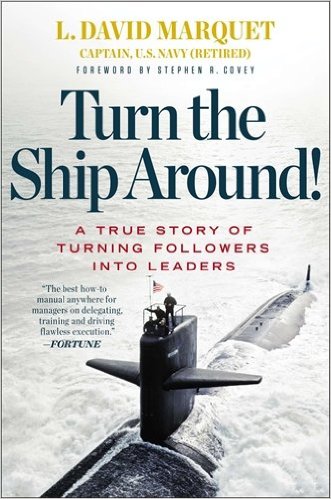
-
Book Review: So Good They Can't Ignore You
Filed under: money, work, book review
In 2005, when I was a penniless grad student, I worked the maximum allowed (for foreign students) 20 hours each week to pay for rent and groceries. These paid $6 to $10 per hour and consisted of repetitive labor-intensive work: restacking library books, grading assignments, serving food, and so on.
During those long hours I often wondered, sometimes with a jealous tinge, what my fully-sponsored classmates knew or did that was worth $15,000 a semester of tuition plus $3,000 a month of stipend. That was a king’s ransom! What’s worse, I was smarter than most of them! (Did I mention I was very naive back then?) It felt really unfair.
Continue reading -
Hubot - my very own J.A.R.V.I.S.
Filed under: technology
While Mark Zuckerberg builds his own version of Iron Man’s Jarvis this year, I went ahead and built a less ambitious (but no less fun) bot for myself last month.
Meet mbbot - my personal instance of Github’s popular hubot project.

Hubot running on a Slack instance
Continue reading -
Scaling Agile Down to a Single Task
Filed under: agile development
My boss Cedric once gave me an idea that reshaped how I thought about code reviews and about dev tasks:
Continue readingThe code review is an accountability conversation
-
The Last Inspirational Quote You'll Ever Need
Filed under: quotes
Continue readingRaise your self to such a level
That before every decree,
God asks you Himself
“Tell me, what is your wish?”
-
No margin, no mission
Filed under: sales, people, values
One of the greatest things you can do for your employees is to ensure that your business is sustainable. Employees tend to take it for granted, but small startups know this is not the case.
There is a story about a business-school professor who was very frustrated with his class one day. Their assignment was simple - to identify “what is wrong with this business?” The students had pored over the company documents - balance sheets, mission statements, annual reports, and come up with tons of ideas, but none of them seemed to satisfy the professor. “No! No! No!” he shouted to every idea they came up with.
Continue reading -
A Better Model of Networking
Filed under: self-improvement, networking
Like most people, I don’t enjoy “networking” for its own sake, but it’s not a dirty word to me. It’s a part of business and a key component of taking charge of your career. But as an introvert, it’s not something that comes easily.
So as any good engineer would, I’ve tried to find a model of networking that fits my beliefs and that I can live with.
Let’s get the basic premise out of the way: Networking is about giving.
Now let’s examine this giving and what forms it might take.
The Godfather Model: “with strings attached”
This kind of person says I’m helping you now, with the expectation that you’ll return the favor at a later time.
Continue reading -
Would you do that again?
Filed under: self-improvement
Would you enthusiastically re-hire that employee, given a choice?
Would you take that job again, given a choice?
When it comes down to it, that’s the real test of whether a decision was regrettable or not.
Continue reading -
Pay It Forward
Filed under: books, charity
When it comes to books, I am a bit of a hoarder.
This is the smallest of my 3 bookshelves
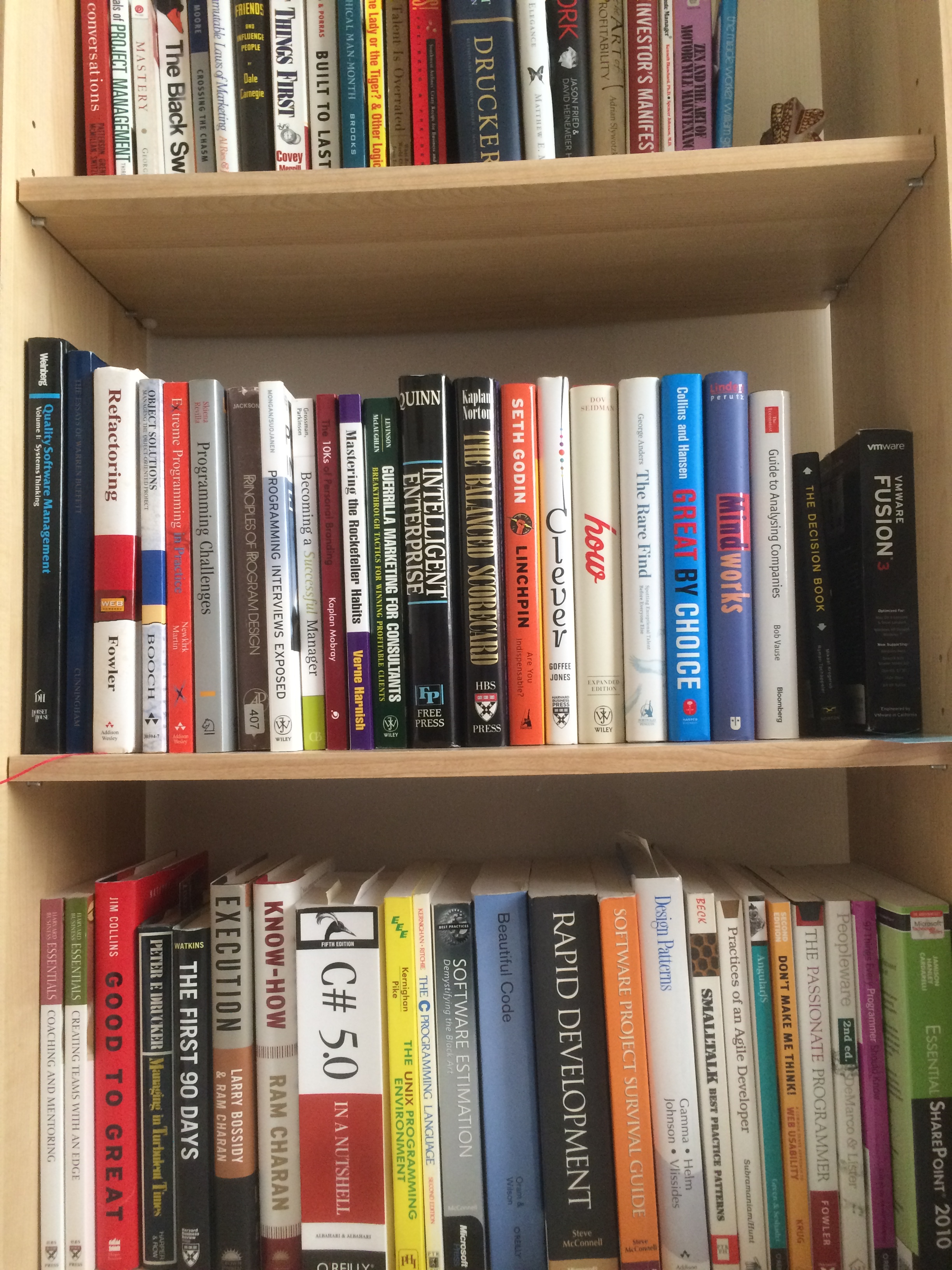
It struck me recently that this is quite a sorry state of affairs.
First off, if you’ve really imbibed the lesson(s) of a book, you shouldn’t need it anymore. How does mere ownership help you anyway?
Continue reading -
Success Theater
Filed under: psychology, work
Does your team’s culture emphasize success, or Success Theater?
Continue readingRemember, no one’s as happy as they seem on Facebook, as depressed as they seem on Twitter or as insufferable as they seem on Instagram
- Maura Quint
-
The most difficult thing...
Filed under:
I'm convinced that the most difficult thing is to convince another person of an idea that they don't buy into.Continue reading -
On Continuous Improvement, Part 2: Use tough times to break a rut
Filed under:
In a previous post, I looked back at instances of stagnation - in IT systems, careers, relationships. In this post I'll talk about why difficult times should be welcomed as a way to spark creative thinking and good habits. In the next post I'll share some ways I've found to keep those habits. Continue readingIt's about the feedback loop
Filed under: agility
Great tidbit of insight from Kent Beck today at hack.summit():
Q: “Do you use TDD at Facebook? Is it always good to do TDD?”
Kent: “TDD is not always the best thing to use. Some of the things we’re doing at Facebook have never been done before… no one has used memory or code in these ways before. You don’t even know what the outcome is going to be, so how will you write a test for it? It’s not about being religious about a methodology. It’s about the feedback loop - the faster you can get that feedback, the better, whether you use TDD or not.”
Continue readingBeing Present
Filed under:
“90% of success in life is about just showing up” - Woody Allen
Continue reading“Showing up is not enough” - Dan Shipper
"Things I wish I knew when I was 22"
Filed under:
Continue readingA great article by Brent Beshore, CEO of AdVentures. Some ideas I can take away immediately are:
Focus. Stop being busy, instead measure what you accomplished.
Specialize. Be the go-to person instead of hunting. Focus on being excellent at one or two things.
Build a history of success. Because services are judged on their history of success, unlike products which are judged on their features and merits.
Profits matter. Or as someone else said: "If there's no margin, there's no mission"It's important to be Insanely Great
Filed under:
*(Note: I’ve been cleaning out my drafts folder, and this post from a few years ago caught my eye - because of the link to Aaron Swartz’ blog. This was written before I even knew who Aaron was and before his tragic, highly public death. Decided to publish this anyway.)* An interesting post about the Kindle v/s iPad user experience. The author points out that even though the Kindle has a lot of delightful touches, it also has some WTFs, which in the end overpower the UX. Continue readingOn Continuous Improvement, Part 1: Avoiding stagnation
Filed under:
The truth of my IT career is this: most systems I've built for clients were Version 2.0 of a system that was left to stagnate for 12 years. This means that Continue readingLeader v/s Follower
Filed under:
A leader is steps ahead in thought, contingency spotting and planning.
A leader sees risks and outcomes better than a follower.
A leader's communication is strong, clear, succinct and decisive.
Continue readingGrowth and Learning in 2015: lessons from my most difficult year
Filed under:
Advice "to my former self" from my 30th year. The worst year of my life - but also the best because of the lessons it taught me. If I had to live it over again, here's what I'd wish I had known. Continue readingMastery - by George Leonard
Filed under:
Unlike its more famous namesake, this Mastery is a smaller, more personal and practical book on the path of the master.
Continue reading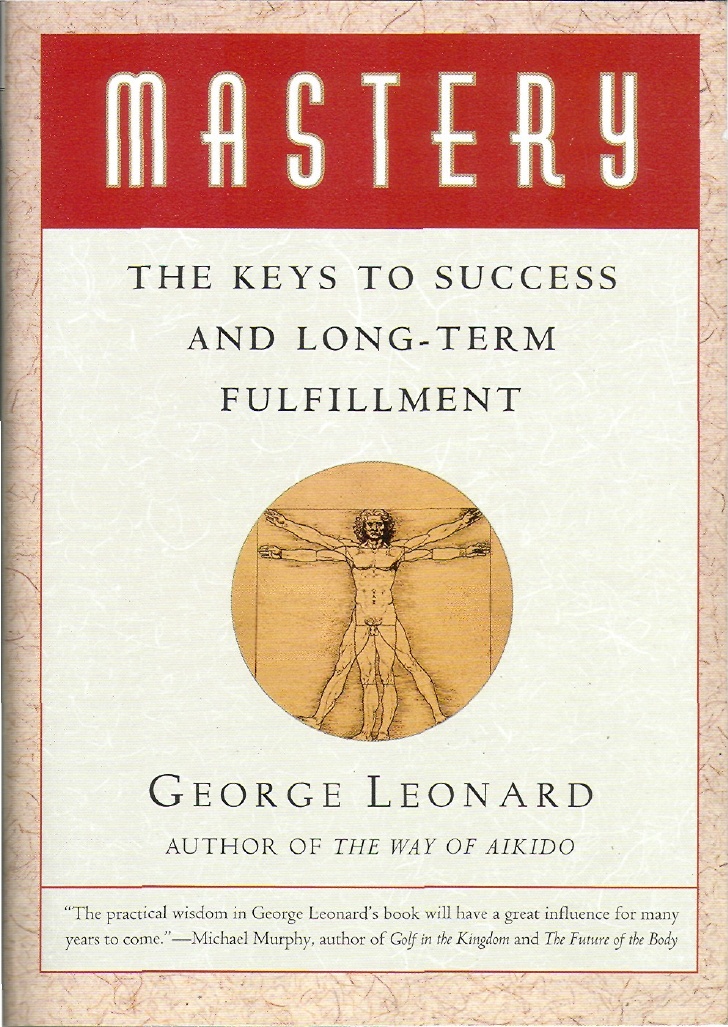
How O'Hare got its name
Filed under:
This is an apocryphal story that I came across, but as a father of the best 2-year old tyke ever, I'm a sucker for tales like this right now. Enjoy.Two small stories (they're connected) that show how the example we set today may help shape the character of generations tomorrow.STORY IWe all know about Al Capone. The notorious Mafia gangster who virtually owned Chicago. He was a crime boss who lorded over the windy city dealing with all sorts of crimes - from prostitution to murder - to you name it, and he escaped the law for many many years.It was because of one man, his lawyer nicknamed "Easy Eddie." Eddie was very good! In fact, Eddie's skill at legal maneuvering kept Big Al out of jail for a long time.To show his appreciation, Capone paid him very well. Continue readingMy 2016 Reading List
Filed under:
You’re a smart person, so you already know that most business and self-help books are BS.
However, many of my key insights in life have come when I’ve been reading something unrelated. Often it’s an idea I picked up from a serious book, but that only came back to hit me while I was reading a lightweight one. Maybe the secret is that mix of curiosity and mild skepticism (sign of an engaged, scientific brain) that automatically kicks in for certain kinds of books but not for a recognized classic like The 7 Habits.
Continue readingWhich of your assumptions is wrong?
Filed under: programming
tl;dr: When working on a WTF bug, I always remember my friend and programming mentor Matthew Hayes’ advice: “Be scientific, and eliminate the possible causes one by one.”
Indulge me as I document my boneheadedness today.
Continue readingMitti Da Bawa - a haunting dirge
Filed under:
Based on a poem by Shiv Kumar Batalvi, this song is about a woman who yearns for a child of her own. Her husband is away for long periods. She makes a clay doll that she treats as her child, singing it this lullaby. She sings that her child doesn't cry nor walk nor ask her for anything. She also realizes her jealousy toward other women who she sees happily playing with their children. Continue readingParameterized testing with Enumerations using Fixie: part 2
Filed under: programming
This is a conclusion to Part 1 about adding parameterized tests to Fixie.
Last time we spoke about some approaches to adding parameters to Fixie, a la NUnit’s TestCaseSource parameter. I promised a better attempt than the first one.
The finished sample was submitted to Fixie, and Patrick did end up merging it into the Fixie source.
The
TestCaseSourceparameter can accept any method, property or field that returns anIEnumerable<object[]>. Your test will be run once for each value in theIEnumerable<>, with theobject[]array being the parameters that get passed in.Check out the source and samples, and feel free to leave comments and suggestions!
Continue readingGuide to Software Developer job advertisements
Filed under: humor
(came across this on a forum today - source is unknown, but I’m happy to add attribution if you ask)
Continue reading
Parameterized testing with Enumerations using Fixie: part 1
Filed under: programming, fixie, unit testing
Situation: We want to run the same test for multiple values of an Enumeration class. For example:
- your SUT is a method whose output value depends on the item’s status; and you want to test for each possible status
- your SUT is the handler for an Edit form, and you want to run the test for each possible value in a select list
The NUnit solution:
NUnit has a
TestCaseSourceattribute that lets you do this easily. Any field, property or method that returns an IEnumerable can be used to send in parameters to your test case.Just define your data source:

And add the data source as a
TestCaseSourceattribute to your test method. Your test will now run once for each value in theValidStatusesenum:
I love this feature in NUnit, and wanted to use it for another project that uses Fixie, a convention-based testing framework from my colleague Patrick Lioi. (p.s. Check it out if you haven’t already, it’s now at version 1.0!)
The Fixie Solution
Looking for ways to do this, I found an example in Fixie’s documentation that lets you parameterize your tests with a custom
Inputattribute:
In this example the test will run twice - once for each repetition of the
[Input()]attribute.This is close, but not quite what I envisioned, because for multiple parameters it gets messy quickly. Let’s say my Edit form had two select lists - one with 3 options and another with 2 - I would then need 6 Input attributes on my test method! Not to mention, what happens if I add a 3rd select list to the form, or some new options to my select list? A maintenance nightmare, that’s what:

What I’d really like is a convention that tells Fixie when some Enumeration parameters are being passed in, gets all the values of each enumeration, does the cartesian product, and runs the test for each combination of enumeration values:

Compare this to the previous screenshot. This test does not need to change anymore if you add another value to the Enumeration. As an added benefit, you get an actual Enumeration class instead of just a string/int/short value as your parameter.
Implementation:
The following gist shows how to add an
EnumeratedInputattribute to Fixie conventions, and use it in a test.Implementing the
EnumeratedInputconvention:Example domain with 2 enumerations:
Assume we now have a domain with these two enumerations:
Example usage in Fixie tests
In the gist below, we have added an
EnumeratedInputattribute to the test, which takes 2 parameters. The result will run n1*n2 times, where n1 and n2 are the number of enumerations.Next Steps:
We’re still not all the way there; since our ultimate goal is to not just use enumerations, but to be able to define our own test case sources. But… we now know how to write a parameterized test using Fixie and how to write a convention that recognizes that parameter. This will come in handy for our next step. Stay tuned for the next blog post!
Thanks: Hat-tip to Sharon Cichelli and Patrick Lioi for helping me on this!
Update: next blog post is here!
Continue readingGit productivity with aliasing and multiple commands
Filed under: programming
If you use Git for version control, then committing, branching, merging and rebasing are some of the most common tasks you perform. Multiple times a day, sometimes multiple times an hour. Why not speed them up a bit?
Continue readingWhen Offshoring Makes Sense – And When It Doesn't
Filed under: consulting, offshoring
(Originally written for and published on Headspring’s blog)

The onshore versus offshore resource debate compares apples and oranges. Most IT decision makers already understand the tradeoffs of working with a team several time zones away for the sake of speed and thrift.
Those same IT enterprise decisions are often less clear, however, when seeking to build an integrated team either through their offshore partners or within their own departments. In this scenario, they’re comparing a small, stealthy and locally embedded team with finite resources against an outsourced army managed locally. Choosing between these two options, on paper, may seem like a tough decision – but depending on the project, it is not.
Continue readingBook Summary: Magic Words
Filed under:
Magic Words: The Science and Secrets Behind Seven Words That Motivate, Engage, and Influence - by Tim David
Why this book?
We all want to lead and influence others, but nobody wants to be influenced. How then can you influence others as a leader?
I've had a strong fascination for the brain's cognitive biases, the fallacies we exhibit without even being aware of them. They can be used to move us in the right direction - as a good leader would, or to take advantage of us - as a con artist would. Knowing the biases and recognizing them day-to-day is something I'm practicing Continue readingMigrating to the Cloud: Five Lessons Learned the Hard Way
Filed under: work, life
(Originally written for and published on Headspring’s blog)
A key question any CIO has faced over the last few years is: Are your systems ready to move to the cloud?

It’s not one that can be put off any more. Platforms have matured tremendously and costs have fallen to the point where the advantages outweigh the risks.
I have worked on several cloud migration projects and found that nearly every organization will go through a few hard knocks before they can see any benefits. The good news is, you can now benefit from the accumulated lessons that the industry has learned over the past decade. The first and most critical step: create your migration roadmap.
Continue readingThe Long Break
Filed under:
I took a long break from blogging as I tried to introspect and understand myself better. It was a challenging, sometimes rewarding journey. Now things are better - and I can start sharing and writing again.
Continue readingMaking your goals public (the right way)
Filed under: work, mentoring
(Originally written for and published on Headspring’s blog)

I’ve heard this self-help mantra so many times, in so many forms, that until recently I had accepted it as truth:
If you want to achieve your goal, make it public.
Until recently, when I saw this Ted Talk by Derek Sivers. The thesis: telling someone your goal makes it less likely that you’ll achieve it. Your brain tricks you into believing that “telling someone” = “progress”. You’ll get a flush of endorphins, but your motivation to do the work actually diminishes. And the bigger your stated goal, the worse this inverse correlation gets.
Continue reading2013 in review
Filed under:
As evidenced by the number of posts in 2013, this has been a hectic year. An amazing year, filled with ups and downs, but worthwhile because it was a year of proving out who I am and what I'm meant to be. The list below is just a catalog of its highlights as I see them today. Who knows what I'll remember 2, 5, 20 years from now, but it's worth remembering some of these things. Not just for myself, but for the people who helped me get here. I've come to realize and accept that I am a man of many deep flaws and only a few good qualities. Continue readingApple v/s Samsung: isn't it obvious?
Filed under:
Samsung's legal arguments, whatever they may be, can't hide the fact that they are a me-too company with no sense of design aesthetics - albeit one with a great manufacturing arm.Continue reading
Rene Ritchie from iMore puts it best:It's not that Samsung doesn't continuously push the limits of hardware specifications and capabilities as much if not more than anyone else. They do. But they do so by systematically, institutionally copying what other vendors have already done first. [...] Rather than setting a course for the future, they set out to subsume the present.
I can't wait to see what the judgement is - it is going to have massive implications on the mobility market, and certainly affect the patent cold war that Google, Apple, Microsoft have been fighting for a few years now.
More links: #, #Why overachievers self-destruct
Filed under:
Why do overachievers self-destruct? A very thought-provoking article from Subroto Bagchi that examines the problem and offers the antidote: humility.Continue readingIt's funny, the world does an excellent job of beating humility into "average" people. By age thirty, you have been told by a good number of people exactly is wrong with you and why you won't succeed in life. Sometimes you may even start to believe that talk, which then becomes a self-fulfilling prophecy.Overachievers have the opposite problem: they are elevated to demigod status by their teachers/coaches/bosses/agents. Every victory was ordained, every success was predestined because they were just that good. Consider Michael Phelps, or Kenneth Lay, or Tiger Woods, or the millions of shooting stars in the business or sports firmament. They all began well. Their early victories were forged with hard work, discipline, self-sacrifice and sheer force of will. Success soon arrived, followed by fame. They had it all and the media and the fans and friends and family believed they would never fail.But then they imploded. One tiny lapse, then another, and another... pretty soon the foundation of their success turned into rubble. Maybe they just didn't want to pay the price of success anymore - after all, it is heavy. Or maybe they felt like they didn't need to pay it anymore.Sometimes you get lucky and an external event or competitor brings you down to earth. Federer ruled the men's tennis world until Nadal came along, followed by Djokovic. Their mutual competition has kept them all humble and hard at work, and the level of tennis is breathtaking to behold. In contrast, Tiger Woods stood alone at the peak and subsequently self-destructed. A tough competitor or a handicap can be the best thing that ever happens to you. It keeps the fire burning in the belly.You should treat success like a landlord who demands a steep rent. If you stop paying, you will get booted out, no matter how much you've paid in the past. If you start feeling like things are getting too easy at work, if nothing raises that anxiety/excitement in your gut any more, watch out. Watch out. You may be headed for a fall.The No Excuse List
Filed under:
Continue reading"If only I had an enemy bigger than my apathy I could have won" - Mumford & Sons
Here you go. Get started on whatever you wanted to learn. For free.Now what's your excuse?Do you design for the majority?
Filed under:
Every design has some implicit assumptions about its users. Good designs often delight us by thinking about the edge cases and handling them gracefully (whether in software like iTunes, or physical products like the iPad). Bad designs are often designs by default - issues like accessibility, language barriers and tech savvy are not integral to the design process.Continue reading
The same applies to your "processes" at work. How are decisions made and conveyed? How is information shared? Are your meetings structured such that the loudest, most opinionated person wins? Is important detail often conveyed to your team via hallway conversations?
Think about which "users" you are leaving out.
What if a deaf person joins your team? http://davidpeter.me/stories/being-deaf
Or an introvert? http://blogs.hbr.org/cs/2012/07/how_to_manage_your_smartest_st.html
Processes, just like products, require utmost care in their design and must frequently be stress-tested to find their hidden assumptions. You'll be surprised how much they can improve.Perspective
Filed under:
Just finished reading a story that I'd love to share.A native of a primitive tribe once came to Manhattan and was asked what he thought of it. His response: "They don't see the sky".Continue readingEmployee Burnout is a good sign
Filed under:
A number of articles in the last 2 days have been trying to make sense of a weird statistic: American worker productivity fell by nearly 1% in Q2 '10.Most of them have got the economic fallout spot on: employee productivity falling means that companies are reaching the limit of what they can achieve with the number of employees they have. And to continue growing they'll need to start recruiting.Over the next 2-3 months I expect the two numbers to do an inverse-correlation dance: as productivity declines, more people will get hired, thus increasing productivity, thus halting more hiring until the productivity declines again... and so on. But overall, I have no doubt that this is good news for the unemployed.Continue readingMeatball Sundaes
Filed under:
I'm in the middle of Seth Godin's book Meatball Sundae, which is quite insightful. One statement of his - "Marketing does not support the organization. The organization supports marketing." - has been rolling around my head for a while. Could it be true? If so, what are the implications for the way companies perform marketing today?More to come after some time to let that thought simmer.Continue readingMila's Daydreams
Filed under:
Ingredients: one baby, standard size. Bunch of random household items. One creative mom. Outcome: an awesome, lovable blog.How innovative is that? And what a great way to build great memories with your child!p.s. If you have twins, you should totally do dreams within dreams, Inception-style!Continue readingFinancial Journalism and Sturgeon's Law
Filed under:
I'm trying to teach myself how to invest, and how to perform financial analysis on a company. A part of this effort involves reading the financial news everyday.After several weeks of trying to make sense of all the stuff that comes out of Wall Street analysts' mouths, of trying to find patterns between a company's earnings report and its stock price movement, I've come to realize this: nearly all of the pseudo-journalistic babble coming out of financial media outlets is total nonsense. Crap. BS. Piggy-wiffle.Which leads me to Sturgeon's law: "90 percent of everything is crud".You may not have heard of Theodore Sturgeon until now, but you have to agree he's a genius! Seldom has such truth been spoken so succintly.Continue readingWill Michael Sheen play Tony Hayward some day?
Filed under:
Michael Sheen has made a career portraying historical figures - mostly British - in movies and on stage. He's played David Frost in Frost/Nixon, Tony Blair in The Queen, Kenneth Williams, H.G. Wells, Brian Clough, Emperor Nero, and more.I think I've found the perfect next role for him. Coming soon to a theatre near you... Michael Sheen as BP CEO Tony Hayward in... "Top Gun 2: Top Kill"!
 Seriously... can you tell the difference?p.s. - Someone might make a cheap joke and say that Sheen already has the right experience, having played a vampire twice as well as Nero. Let me say here that Hayward seems to me to have done a fairly good job in the Gulf spill crisis - inasmuch as one human being under great stress can do. That is to say, there aren't many people in the world who could have done better under the circumstances. Aside from keeping his mouth shut, of course.Continue reading
Seriously... can you tell the difference?p.s. - Someone might make a cheap joke and say that Sheen already has the right experience, having played a vampire twice as well as Nero. Let me say here that Hayward seems to me to have done a fairly good job in the Gulf spill crisis - inasmuch as one human being under great stress can do. That is to say, there aren't many people in the world who could have done better under the circumstances. Aside from keeping his mouth shut, of course.Continue readingBP's $20Bn fund adversely affects lawyers
Filed under:
According to WSJ, lawyers looking to cash in on the Gulf oil spill disaster have some bad news - BP's $20 billion claims fund may be cutting them out. Interesting - perhaps this is one of the reasons BP agreed to set up the fund?As much as I am in favor of BP repaying those harmed by this tragedy, I am completely against lawyers/sharks trying to make a windfall from other people's misfortune. Serves them right, I say.Continue readingWhy is a college education so expensive?
Filed under:
Continue readingNY Times points out that higher education costs are rising fast, even during a recession. That's bad news for students and families who took on tremendous debt - because if they can't pay it back (like most students who graduated without a job in 2008-09), bankruptcy is not an option. The article asks a good question: at what point will the cost get too prohibitive?It's true that Ivy league professors, like Wall Street bankers and Medicare doctors, get paid disproportionately high salaries relative to the benefits they provide to society. I call it the "NASA effect" - despite the trillions of dollars poured into NASA, the list of real societal benefits from that organization is rather banal. And yet nobody shuts it down or reins it in, because in the public's mind NASA stands for more... things like national pride and human achievement and mom and apple pie. There's too big a halo around it.Ditto with an Ivy league education.So here's the key question: what exactly is all that tuition money buying you? And can you get it cheaper elsewhere?I've studied at a top-10 institution (grad) and a softer, tier-2 one (undergrad). Here's my breakdown on what I got from the top school:Trade skills: To be honest, none of the courses I paid for have been relevant in any way since the day I left. Those skills could have definitely been obtained at a cheaper price elsewhere.Life skills: I did learn a lot of intangible lessons, though. Competing with the best and brightest in the world took me to levels I didn't know I could achieve. Learning from great minds and being inspired by their research was incredibly rewarding. And knowing that I survived and (to some extent) thrived in that environment is something nobody can take away - it's a level of self-confidence that is hard to achieve any other way. That benefit was certainly worth a lot. Maybe there are other cheaper ways to learn those life skills - internships/jobs at top companies, a stint in the armed forces, etc.Network: There's also the amazing bunch of people I met and befriended. The world has learnt all about the benefits of networking, of course, but there's networking and then there's bonding over a shared experience. Again, not something you can replicate easily. If you've seen two Aggies or two Gators meet, you'll know what I mean.Brand name: Finally, there's the halo effect that other people bestow upon you for being from a top institution.Now let's monetize these benefits. Say my overall tuition was $100. And you, as my parent/banker/sponsor, ask me to itemize that bill over these four areas. What would that breakdown look like?For someone in an Ivy league school, I'd bet the breakdown looks something like 10/40/30/20. That is, the coursework is only about 10% of the total educational value, the life skills about 40%, and the network and brand name are about 30% and 20% respectively. For students in certain fields like finance or MBA, the ratios might actually be closer to 5/35/30/30 (remember, their boardroom politics depends a lot on their MBA alma mater). And here's the kicker: if you change the numbers to reflect their value over your lifetime, they get skewed even further: more like 1/34/35/30.At the other extreme, for someone going to a trade school, the same ratios might look like 90/5/5/0. They're mainly paying to learn a skill; and they don't expect much from their fellow students or university after they leave. And those numbers won't change much over their lifetime.(Please note: I'm generalizing here, of course these numbers have no relation to anything in the real world. I'm merely using them for the purpose of this mental exercise).If you control for the value of the education, then just from these numbers, you can see that an Ivy Leaguer should be willing to pay 10 to 90 times the tuition of someone going to trade school. And when you actually start to factor in things like quality of education, professors' salaries, brand name cachet etc., that number goes up into multiples of 1000.Marketing 101 says you don't price an item based on how much it costs to produce; you price it based on what the market is willing to pay. Universities know that students are willing to pay through their nose for an entry. Students, in turn, know that the job market will reward them lifelong for having a top degree.Bottom line, most schools today are trying to strike a balance between what they offer in terms of value and what they charge in fees. But the truth is that when you account for lifetime returns, a college education is still fairly priced - perhaps even underpriced.Bonus: "Why do professional athletes make so much more money than teachers? Isn't education more valuable to society than entertainment?" Find the answer here.The Warren Buffett testimony
Filed under:
Continue readingWarren Buffett testified before the Financial Crisis Inquiry Commission this week. The financial media is calling his testimony a PR disaster for the legendary investor. I didn't see it that way at all. The whole event looked like a farce to me, and at the end only Buffett came out with the least mud on his shirt.Let's look at each of the players in turn:The Inquiry Commission (FCIC):What was their objective? If they really wanted to get deeper into the ratings business, why was only Moody's called to the hearing - where were Standard & Poor's and Fitch? And why such an insistence on getting Buffett - they had to get him under subpoena eventually.What were the board's qualifications to conduct such a hearing? The chairman, Phil Angelides, was California's State Treasurer from 1999 to 2007 - not the best credentials by the looks of their state budget. Ditto the Vice Chairman. If nothing else, you could be sure they had a personal axe to grind against big corporations.Moody'sBuffett was wrong in saying Moody's shouldn't be singled out. So what if everyone else missed the housing bubble? Moody's' culture of integrity was gone way before the bubble, as noted in this excellent Huffington Post article. That was their epic failure which led to everything else. They had a responsibility to the public, and they failed miserably.Maybe Buffett meant that Moody's shouldn't be singled out from the troika - Standard & Poor's and Fitch made the same mistakes, after all. But "everyone else is doing it" has never been a good argument. It didn't work on our mothers when we were young, and it doesn't work today.Financial MediaIt's so much fun to report on hearings like these, with millionaire CEOs getting humiliated and all those zingers flying back and forth. But where were you people when this crisis was unfolding? The culture at these agencies has been askew for more than half a decade - where was your investigative journalism then? Why wasn't anyone reporting on the excesses of Wall Street?Hindsight is 20/20, and I don't need your armchair opinions on Buffett and Moody's and Goldman today, thank you very much. A little more before-the-event diligence would have been appreciated.Investing publicBuffett's biggest point, one that went almost unreported: investors shouldn't have substituted any agency's ratings for their own due diligence. The people who trusted those ratings were a huge driver of this cycle of greed. By blindly trusting Moody's, people increased the desirability of their ratings, which meant ever more companies chased after those AAAs... coupled with the zero-integrity environment, you had a recipe for disaster.One might argue that by 2007, most of these financial instruments had become too opaque, too complex for the ordinary investor to understand the inherent risks. Major hedge fund operators and institutional investors should be sophisticated enough, but let's say they weren't (due to laziness or ignorance or both). So they began to rely on rating agencies to do the dirty work (a.k.a. analysis) for them. Ergo, it became even more important that the ratings agencies acted with integrity, and since they didn't, they are to blame for the market crash.While it's a decent argument, it doesn't help anyone. It's a bit like BP saying the Blowout Preventer should never have malfunctioned, and hence the oil spill is entirely Cameron International's fault (they made the device). And just like the leaking oil is BP's responsibility, what happens to your money is ultimately your responsibility. You invested in something you didn't understand, you were involved in the cycle of greed, so ignorance is neither a defense nor an appeal.If it were raining outside, would you go out wearing suntan lotion just because the weatherman predicted sunny skies?Warren BuffetRead the minutes from Buffett's testimony. You can tell he's in top form (and peak mental health, hooraah!). And if you've followed his speeches/letters for even a short while, you know that he was speaking his mind out there, without evasiveness or lying. Even that bit about Moody's not being singled out - I think he sincerely believes it and probably has good reasons for it.Like most of the businesses he owns, Buffett isn't involved in Moody's daily operations. His remarks indicate he isn't too happy with their performance either - and at present is only invested in the firm because he can't get a good enough price.Overall, I have little faith that these inquiries will get us anywhere. That's a shame because we really need some good legislation, and fast. Such public-shaming meetings achieve nothing.Accountability is the way out
Filed under:
Bad things happen to us all. When they do, some confront the truth and try to make things better, while other go into a death spiral of blaming others.Recently, some people and corporations have stood out in my mind for the way they held themselves accountable:Continue reading- BP's open response to the Gulf oil spill. Specifically, them taking responsibility for all the cleanup costs and legitimate loss claims, over & above their legal liability.
- Obama coming clean to the nation about the Minerals Management Service (a federal agency) cozying up with oil corporations.
- Google apologizing for inadvertently capturing Wi-Fi data, and making amends at once.
- Google being honest with customers and investors about the Nexus One fiasco.
- Goldman Sachs' Lloyd Blankfein's behavior during the Senate hearings.
When you hear such stories in the news, pay close attention to how the accused person or company responds. Some, like Google, admit their mistakes publicly. They also learn from those mistakes quickly... which helps them recover faster. I will make a bet that BP, Goldman Sachs and Google will overcome their recent setbacks and be stronger than ever.The blame game has been everywhere in the news recently. The oil spill, Europe's economic woes, America's jobless recovery, Facebook and Google privacy concerns, Apple v/s Adobe, Apple v/s Jason Chen... how do you know who's right?People (especially politicians) love a scapegoat, because pinning the blame on someone else is easier than taking responsibility for fixing the problem. The media (formerly an honorable profession) also loves these stories because they fuel people's anger and sell more papers. Often they are wrong, and often they ignore bigger problems that get swept under the rug until it's too late.Cases in point:- Greece looking to sue US banks over the market's lack of confidence in Greek bonds, never mind the role played by their government's years of financial mismanagement.
- Michigan senator Carl Levin leading the Senate witch hunt at Goldman Sachs, never mind the "sh***y" state of Michigan's economy that he's done nothing to help.
- Napolitano trying to make BP pay for every single claim related to the oil spill, blatantly ignoring current US liability laws, and making BP the target of every single jobless claim in Louisiana. Does she understand the difference between being "responsible" for something and being "culpable" for it?
- The people who blame Wall Street for the loss of their jobs and having no savings, forgetting their former live-beyond-your-means lifestyles.
When watching a bad situation unfold, look for who is passing the buck, and who is acting responsibly and facing facts. That'll give you a hint about who will emerge stronger in the end.Apple v/s Flash: history repeating itself
Filed under:
How do you justify Apple leaving out Flash support from the iPad?I couldn't figure it out. Yes, Steve Jobs' blog post was persuasive, and yes, Flash isn't ready for mobile devices with touch screens. But to leave out an industry-standard technology out of such an important product was quite risky. Asking the entire developer community to tag along to HTML5 was arrogant, too.Continue readingThat is what I thought. Until I chanced upon an interview Jobs did with Playboy magazine about 26 years ago. Here's an excerpt about the Macintosh:PLAYBOY: Was any of your decision not to become compatible with IBM based on the fact that you didn't want to knuckle under to IBM? One critic says that the reason Mac isn't IBM-compatible is mere arrogance—that "Steve Jobs was saying 'Fuck you' to IBM."JOBS: The main thing is very simply that the technology we developed is superior. It could not be this good if we became compatible with IBM. Of course, it's true that we don't want IBM to dominate this industry. A lot of people thought we were nuts for not being IBM-compatible, for not living under IBM's umbrella. There were two key reasons we chose to bet our company on not doing that: The first was that we thought—and I think as history is unfolding, we're being proved correct—that IBM would fold its umbrella on the companies making compatible computers and absolutely crush them.
Second and more important, we did not go IBM-compatible because of the product vision that drives this company. We think that computers are the most remarkable tools that humankind has ever come up with, and we think that people are basically tool users. So if we can just get lots of computers to lots of people, it will make some qualitative difference in the world. What we want to do at Apple is make computers into appliances and get them to tens of millions of people. That's simply what we want to do. And we couldn't do that with the current IBM-generation type of technology. So we had to do something different. That's why we came up with the Macintosh.Sound familiar?It doesn't matter whether Jobs is/was right or wrong. The point is that the Flash decision was nothing personal against Adobe. It's just how Steve Jobs thinks. It's the way his mind worked back in 1984, and it still works that way today. He has high standards and if a technology doesn't measure up, then who cares if it's the market leader? In some sense he's the ideal capitalist - he believes with absolute sincerity that the market will ultimately choose the best product - his product.The interview makes for great reading. It reveals the extent to which Jobs was a visionary. Here's Jobs describing a computer to a layman:Computers are actually pretty simple. We're sitting here on a bench in this cafe. Let's assume that you understood only the most rudimentary of directions and you asked how to find the rest room. I would have to describe it to you in very specific and precise instructions. I might say, "Scoot sideways two meters off the bench. Stand erect. Lift left foot. Bend left knee until it is horizontal. Extend left foot and shift weight 300 centimeters forward ..." and on and on. If you could interpret all those instructions 100 times faster than any other person in this cafe, you would appear to be a magician: You could run over and grab a milk shake and bring it back and set it on the table and snap your fingers, and I'd think you made the milk shake appear, because it was so fast relative to my perception. That's exactly what a computer does. It takes these very, very simple-minded instructions—"Go fetch a number, add it to this number, put the result there, perceive if it's greater than this other number"—but executes them at a rate of, let's say, 1,000,000 per second. At 1,000,000 per second, the results appear to be magic.
That's a simple explanation, and the point is that people really don't have to understand how computers work. Most people have no concept of how an automatic transmission works, yet they know how to drive a car. You don't have to study physics to understand the laws of motion to drive a car.(remember, computers were luxury toys back then).He all but predicts the coming of the Internet age:PLAYBOY: Those are arguments for computers in business and in schools, but what about the home?
JOBS: So far, that's more of a conceptual market than a real market. The primary reasons to buy a computer for your home now are that you want to do some business work at home or you want to run educational software for yourself or your children. If you can't justify buying a computer for one of those two reasons, the only other possible reason is that you just want to be computer literate. You know there's something going on, you don't exactly know what it is, so you want to learn. This will change: Computers will be essential in most homes.
PLAYBOY: What will change?
JOBS: The most compelling reason for most people to buy a computer for the home will be to link it into a nationwide communications network. We're just in the beginning stages of what will be a truly remarkable breakthrough for most people—as remarkable as the telephone.You begin to get the idea of how far-reaching Steve's thinking was even at that age. And unlike most thinkers or dreamers, he's made his visions real. Over and over again. How do you not respect that?A final quote about him and Apple:I'll always stay connected with Apple. I hope that throughout my life I'll sort of have the thread of my life and the thread of Apple weave in and out of each other, like a tapestry. There may be a few years when I'm not there, but I'll always come back.
(read the full Playboy interview here)Desperate times, desperate ploys
Filed under:
How are foreign students in America, recently graduated and unable to find jobs, coping with the recession?While shopping in an Indian grocery store today, I was approached by a twenty-something fellow with a big smile on his face, who asked me, "Excuse me, haven't I met you somewhere? Aren't you ___'s brother?" I said no, but he kept on trying to initiate a conversation- where do I work? Where was I from? Where did I get my degree? All in an extra friendly manner.I kept my guard up. I've encountered my fair share of Amway-Quixtar types in grocery stores, libraries and other random places. They always start conversations on a "you're Indian I'm Indian let's be friends" basis.Continue readingHe eventually gave up and just blurted out his situation: recently graduated from UT Dallas with a Masters degree, looking for a job, wondering if my company is hiring. I gave him our website, a number he could call (after all, I was in his situation once,) and wished him the best. Later I saw him with two friends hanging around the aisles, scoping potential targets.Is this what it's come to? I mean, ten on ten for innovation, and for having the guts to go through that, but minus five million for execution, right?p.s. - my wife likes to say that Indian men have absolutely no idea how to talk smooth... Americans are really good at this, they play it cool and handle conversations in a way that leaves both parties with an easy exit. Today, watching this guy fumble through an awkward agenda in such a creepy, off-putting manner, I just had to agree with her. Shape up, my desi brethren, prove her wrong!Mandatory smartphone data plans: "Only fair"?
Filed under:
Verizon and AT&T are at the forefront of innovation again - in the field of fleecing the customer. Under the guise of per-byte billing, they're trying to change the current flat-fee data model for smartphones into one that will force you to pay a lot more.If you believe their rhetoric, you might think you'll be paying the same per-byte rate whether you used 1MB or 1000. Use nothing and you pay nothing. It's "only fair".But you'd be so wrong.What they're really pushing is a caps-and-overages system. Here's Verizon's version - each smartphone owner must pay a mandatory base charge of $10, for upto 25MB. If you want more data, you can upgrade to the "unlimited" (read 5GB) plan for $30 per month. Go over your limit, and you pay steep overage charges. How steep? Consider AT&T's recently released international 3G data plan for iPads - $25 for a paltry 20MB of data, $200 for 200MB.Given how ridiculously low the base limit is, most people are thus being nudged into a higher fee bracket. And if you're like most people, you're on a Wifi network at home or office 80% of the time. So you end up paying for a service you never use. More profit for the carriers, more money out of the customer's pocket.Despite public outcry and a lot of media backlash, I don't see the carriers holding their plans back very long. The only thing stopping them is a lack of cooperation. As long as Verizon, AT&T and Sprint see metered billing as a competitive difference, we the consumers are safe. The moment they all decide it's the right way to go, that's it.Continue readingThe Real Estate Generation Gap
Filed under:
A highly recommended read on the differences between baby boomers', Gen-X and Gen-Y's views on home buying... and why it's hurting a lot of boomers financially.There is a lot of good analysis here. Points that I found especially relevant:Continue reading- People's real estate needs change as they get older. Folks who have stayed in or around Boston all their lives now want to move to warmer climes for retirement. But who's going to buy their million dollar palaces in the 'burbs?
- Predicting the future based on any single generation's characteristics is really hard. The author cites some famous economists whose predictions were 180 degrees off target - because they failed to account for immigrants or the boomers' continued prosperity.
- The boomers' classic mistake of tying up all their net worth in their houses; thinking that they'll always be able to sell it for more than they paid.
- The positive effect that upwardly mobile, highly educated immigrants bring to the community. In all the discussions of the financial crisis and its solutions, I've yet to come across a journalistic piece that is so articulate on exactly why America needs to open its doors to more immigrants.
- The conflict between short-term and long-term interests. Wealthy homeowners don't want lower-income people entering their communities and accessing the good schools their taxes paid for... but 20 years down the line, those well-educated kids will be same wealthy adults that today's homeowners will be selling to. It's an interesting give and take.
A crisis is just what we need
Filed under:
An old but excellent article from Newsweek that discusses the reality of America’s entitlement programs like Social Security, Medicare and Medicaid. Not only are these systems sinking financially, their weight is dragging America’s economy down with them.
In a previous post I said that our #1 priority in healthcare reform should be to make healthcare itself more affordable - i.e. the cost of going to a doctor or a hospital, the cost of prescriptions, etc. This has nothing to do with insurance - it has to do with what doctors, hospitals, pharmas etc. charge for their services - which I believe is totally askew. The debate currently focuses on insurance, and how to rearrange the numbers to make it all work. Everyone sees insurers as these evil megacorporations that are crushing the little people to squeeze some extra profit. That’s not entirely false, but it misses the point.
I originally said that removing the middlemen (i.e. the insurance agencies) would be a solution. Over the last few days I’ve researched more, and concluded that judgment hasty. The insurance agencies provide a lot of important services to the healthcare system - not least of which is keeping doctors/hospitals/pharmas in check. It’s a tough industry, with patients expecting them to pay for everything under the sun, and DHPs trying to squeeze out the maximum profit.
In light of my research, I think we can and should do a lot more to reform the entire system. Here are a few more suggestions.
1) Reform the medical training and recruiting process. I am an immigrant. An engineer by trade, I found it relatively easy to enter a great university for higher education, find a job and get my visa processed. I say relatively - because compared to me, most immigrant doctors have a hellish time getting into residency programs. And the number that actually does make it in is extremely small. This makes sense, since most residents’ tuition and expenses come out of the Medicare budget - which means eliminating waste in the Medicare system would be a way to open the gates to more qualified medical professionals.
2) Reform medical malpractice legislation. The whole system pays a huge cost (tangible and otherwise) to keep the malpractice sharks at bay - and that cost is ultimately borne by us. By encouraging frivolous lawsuits and awarding ridiculous payouts, the judicial system has seriously distorted the priorities of healthcare professionals. Why else do we hear horror stories of people not receiving care, waiting in the ER for hours and hours, because doctors won’t touch them until their insurance paperwork comes through?
3) Create better checks and balances on doctor’s fees and practices. Right now doctors name their own fees to Medicare and insurance agencies. It’s up to the insurers to fight doctors and hospitals on what procedures they deem necessary. The way this plays out is almost never to the benefit of the patient - simply because he’s out of the loop.
4) Educate people on their healthcare options. My friend recently had to pay everything out-of-pocket for a procedure for his visiting father (he didn’t have visitor’s insurance when coming over). While the cost was quite high, he was still able to slash the potential bills by almost half, by asking lots of questions and being persistent. He found that there are alternatives to almost everything - you don’t need a $15,000-per-night room for a procedure; you don’t have to accept the first thing that doctors, nurses and hospital staff tell you; and most importantly, negotiation is possible. The better informed you are, the better your chances of saving.
Sadly, almost everyone who has insurance is completely blind to these facts - something that doctors and hospitals count on so that they can get the maximum out of the insurance companies.
5) For all non-essential procedures, force doctors and hospitals to discuss all potential options, and their relative costs, with the patients or their PILO. According to my friend who designs IT systems for hospitals, doctors have complete lists of options on what procedures to perform, how much each one costs, etc. They are encouraged to opt for the most expensive ones by their superiors and by the pharmas. Such practices, when taken cumulatively, cause significant harm to the system.
Note: I am still educating myself on the whole healthcare system - how it operates and how it got this way. More thoughts and ideas to come soon. Any informative opinions welcome.
Continue readingEarly adopters
Filed under:
Lately I’ve been getting tired of iPad owners proclaiming themselves “early adopters”. Why has it suddenly become such a badge of pride? Isn’t it annoying enough watching them parade the device around?
There’s good reason why the majority of people aren’t early adopters. The first generation of any product/technology is usually the worst. It’s buggy, expensive, unproven, and the ecosystem isn’t there yet to make it a value proposition. Later versions are packed with more features, important bug fixes and better support. And historically, it’s not the innovator company that profits when the product/technology finally goes mainstream… it’s someone else who came up with a better 2nd or 3rd generation, and had the staying power to cross the chasm.
Being an early adopter may be advantageous in certain situations. Tennis pros using better racket technology, swimmers wearing advanced suits (now banned), development teams using Agile methodologies, are examples of that. But for consumer products like the iPad, there’s no tangible reason for the buyer to be proud of early adoption. Can you imagine someone who proudly said they’re early adopters of Motorola’s Iridium phones? Or HD-DVDs?
iPadders are just trying to feel good about their purchase by rationalizing an impulsive decision. One day, we’ll look back on the iPad launch, and say this was the day Steve Jobs’ reality distortion field finally went mainstream.
Continue readingHealthcare reform: missing the point
Filed under:
Note: in a follow-on post, I’ve penned a better-researched, more considered opinion on healthcare. This post is kept intact for historical purposes. Feel free to read this first, though, as I feel it documents the problem I see.
An interesting article from CNN.com. It basically blames the economic crisis on rising middle-class costs - healthcare and education. These increasing costs made people go on borrowing sprees, and China’s loose lending policy provided the fuel. While I don’t agree with all the arguments, I do want to zero in on the rising costs of healthcare.
The current healthcare reform debate ignores a stark reality: healthcare in America is just too expensive. No matter which way you spin the facts, that’s one thing none of the policymakers are discussing. I’m glad this article brings that point up.
I believe that American healthcare professionals are overpaid - exorbitantly so - for the amount of work they do. This isn’t just my observation as a patient - it’s been corroborated by several doctors & doctoral resident friends in top medical schools here. From the number of patients they see, the time they take to provide a diagnosis, to the number of unnecessary tests and procedures they perform, America’s doctors are woefully inefficient compared to the rest of the world.
There are many reasons this system is the way it is. The high cost of a medical degree, the shark-infested waters of malpractice lawsuits, the big pharmas that give doctors kickbacks to prescribe their overpriced drugs… but most importantly, the disconnect between the patients using the service and the insurance companies paying for it. Any time you disconnect the usage of a service from the payment of it, you create inefficiencies.
Medical insurance is a tricky game. Each of the three players has different and conflicting goals - patients want the best care at low cost, doctors want the most money for their work, and insurers want the most profits. The weakest party in this game is the patient. Doctors call the shots on what tests/procedures the patient needs - often ordering unnecessary but expensive tests that simply pad their bottom lines. The insurance giants call the shots on your healthcare premiums. The tug-of-war between those two creates high costs for patients.
An insurance-based model works only if more people are paying into the system than are withdrawing from it - like auto insurance. When that model gets skewed (look at Social Security), the system starts to collapse under its own weight. As America grows older, this model will get skewed badly. The relative size of 20-50 year olds is decreasing, and the aging population is too large for it to support. That younger group isn’t exactly healthy either - problems like teenage obesity, diabetes, smoking and other lifestyle-related diseases are growing.
To stay profitable, insurers have to (a) reduce the per-patient cost, (b) reduce the number of people/procedures they cover, or (c) increase their premiums to crazy levels. Today, all insurance agencies employ a combination of these tactics. And yet there’s no way to sustain this without being unfair to at least one group - either the healthy population will have to pay outrageous premiums, or the aging/unhealthy population will be denied the healthcare they need.
Something needs to be done.
I don’t claim to have all the answers, but here’s a suggestion: remove the middleman. Remove the insurance agencies. Let the market (patients) bring the cost of goods (doctor’s services, prescription drugs etc) down to a sustainable level. For those who cannot pay for their healthcare needs, let’s have the government provide financial assistance, or build up a public healthcare system.
That is why I am in favor or a public healthcare option. If Obama can actually see it through to completion, more power to him!
Continue readingThe Main Street Bailout
Filed under:
I find it intriguing, and not the least bit annoying, when the same people who cry “Socialism!” at Obama’s healthcare program then go around expecting the government to dole out further benefits to the unemployed.
Yes, Main Street, the government gave you a bailout too. Unemployment benefits currently stand at an unprecedented 99 weeks. That’s close to two years of getting paid without a job. Can you do the math?
Disclaimer: I don’t have anything against the unemployed - especially those who are actually trying to reenter the workforce. Just against hypocrites.
Continue readingThe key to effective meetings
Filed under:
I want to talk about holding effective meetings. People have built entire careers on studying this sphere of human activity, and I don’t pretend to be as knowledgeable or scientific as them. But from my personal experience, there are 3 key factors to holding effective meetings: 1) Invite the right people
Continue readingThe Apple Experience
Filed under:
Just have two quick anecdotes to relate about Apple’s user experience management.
#1: Last weekend, I was giving a tour of NYC to some visiting relatives. These folks live in a remote part of India. After a tour of Central Park, we went to the Apple store on 6th Avenue. The line was serpentine and there was a long, long wait to get to the iPads. My uncle, always an eager learner, got intrigued by all the iPad posters. He starts asking me all sorts of questions about the iPad, starts looking over people’s shoulders to see what they’re doing, how they’re using it. He seems impressed, but in a so-what kind of way. Then comes the following exchange:
Continue readingScott Berkun is a must-read
Filed under:
I highly, highly recommend Scott Berkun’s book on public speaking. It’s the most accessible and commonsense book I’ve read on this difficult art.

Even if you aren’t really interested in public speaking, you’ll enjoy Scott’s entertaining and conversational narrative. The first few chapters go into the mind of the speaker, as he/she prepares to stand naked (as it were) in front of a crowd and talk. He gently but expertly debunks the fears we’ve all experienced before presenting to a group.
Continue readingIs Apple losing its developers? Not quite
Filed under:
There has been a lot of talk lately about Apple’s new iPhone OS 4.0 restrictions. A lot of people are asking if Steve Jobs has gone mad, and if this will finally turn a lot of iPhone developers towards Google’s Android platform. Me? I’m not sure.
Continue readingUlysses, by Tennyson
Filed under: poetry
It little profits that an idle king,
Continue reading
By this still hearth, among these barren crags,
Match’d with an aged wife, I mete and dole
Unequal laws unto a savage race,
That hoard, and sleep, and feed, and know not me.Quotes I Like
Filed under: quotes
-
You know youve achieved perfection in design, not when you have nothing more to add, but when you have nothing more to take away - Antoine de Saint-Exupery
-
No distance of place or lapse of time can lessen the friendship of those who are thoroughly persuaded of each other’s worth - Robert Southey
subscribe via RSS












